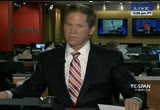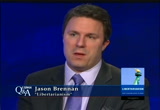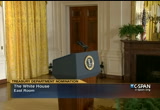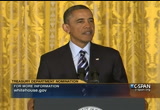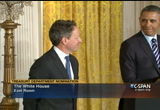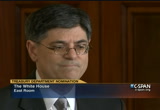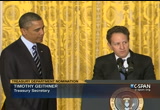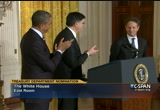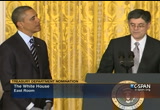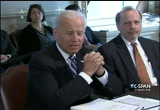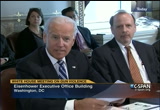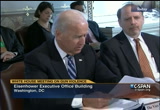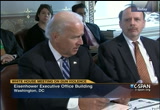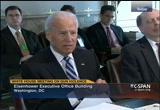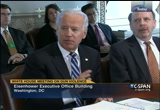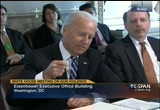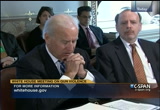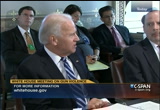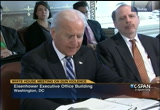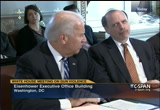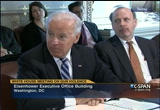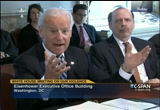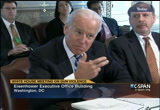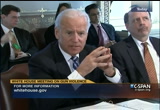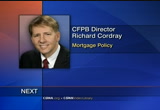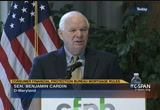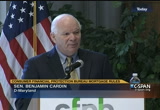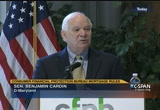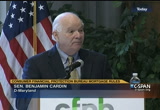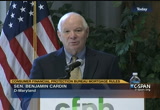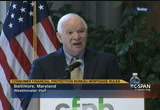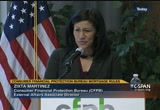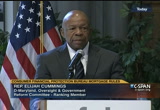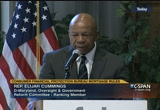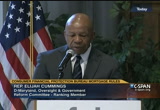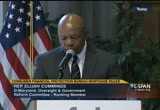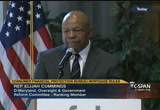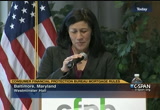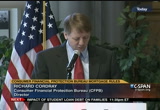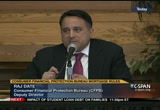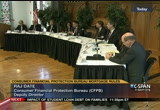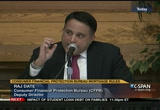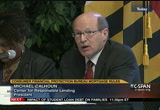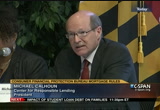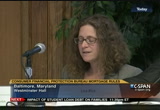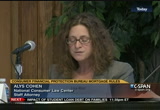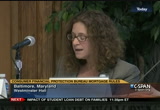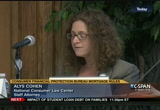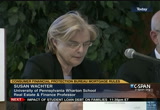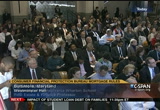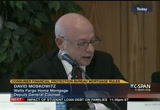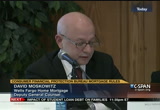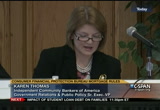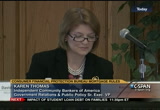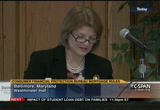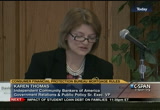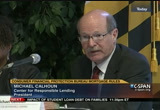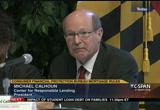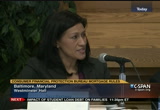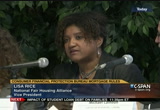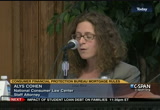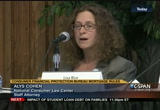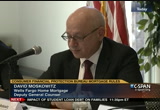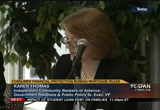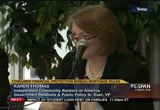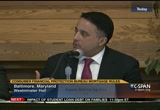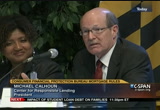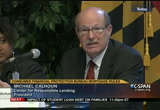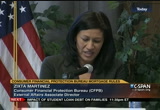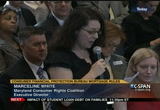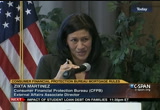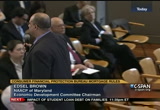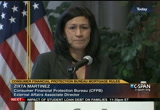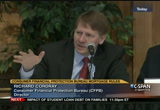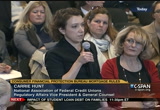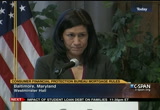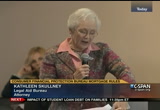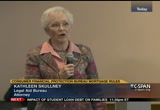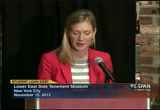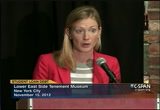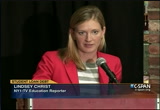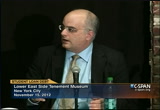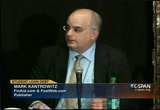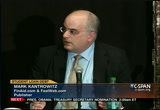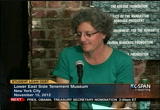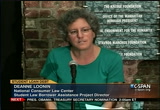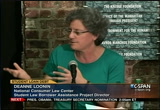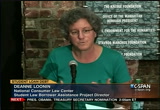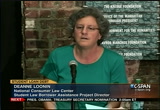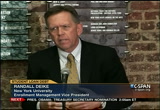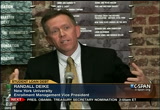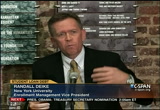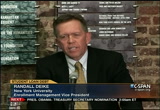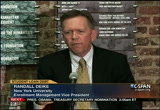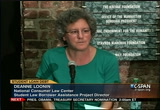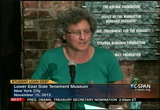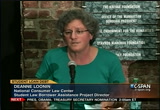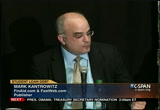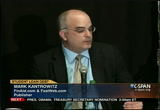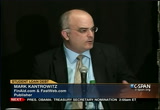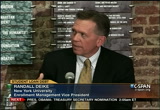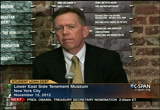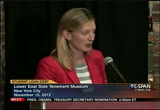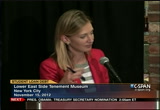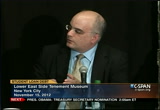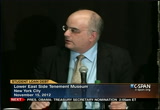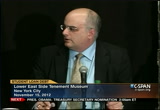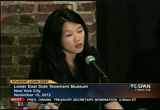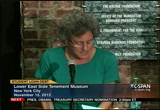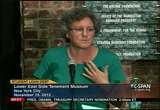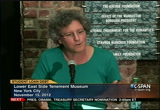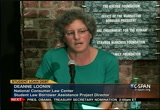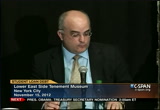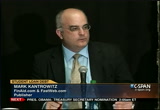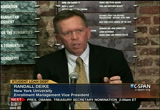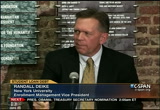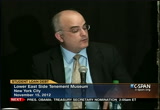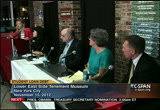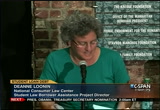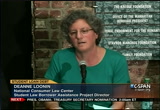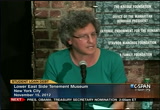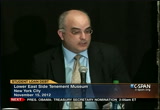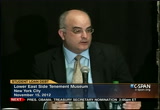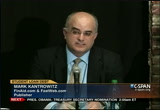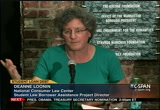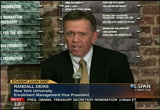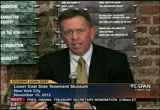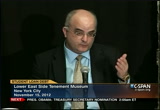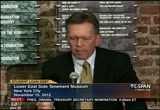tv Capitol Hill Hearings CSPAN January 10, 2013 9:00pm-1:00am EST
9:00 pm
not addressing the costs of education at all. it is about increasing government funding to help students go to school. we need to be focusing on and we need to be focusing on what are the costs that can be reduced to bring these costs down, make schools more competitive, so students have a competitive choice of which university to go to. >> we will let you go, as we hear from traunch mitchell. -- josh mitchell. >> a lot of schools are starting to increase things at a faster pace. i think there is so much scrutiny these days. it is kind of like health care. why are costs rising?
9:01 pm
i think they're going to start to see a lot of pressure from congress to rein in their costs. >> josh mitchell writes for "the wall street journal," and thanks for spending the last half hour with us. >> yes. >> and we appreciate all of your phone calls, comments on twitter, and the conversation continues online, and the question we have been asking is, how much debt is worth going into college? [captioning performed by national captioning institute] [captions copyright national cable satellite corp. 2013] >> coming up, president obama's statement on nominating jacob lew, and then vice-president biden on gun laws. then, a new report on mortgage
9:02 pm
policy changes. later, another chance to see the look at the rise of the student loan debt. friday, on "washington journal," business roundtable's john engler on the fiscal cliff and the updated battles in congress. then, looking at the increasing number of women in congress with stephanie schriock, and after that, michael from the pew research center. "washington journal," 7:00 a.m. eastern on c-span. afghanistan president hamid karzai is in new york this week for meetings with president obama, cabinet secretaries, and members of congress. he will talk about what is
9:03 pm
ahead. live coverage from georgetown university at 5:30 p.m. eastern on c-span. >> if you ask how many are self- identified libertarians, depending on what poll you look at, you may be getting 10% to 15%. if you give people a battery of questions, as in, and "do you believe in x? ?" you believe in y you get more. if you ask if your economically conservative but socially liberal, you get over half of the people saying that is what they are. just because they say these things does not mean they do. if you ask if you want smaller government, they say yes. if you ask them if they want them to spend less money, they will say yes, but if you ask
9:04 pm
them they want to cut things, they will not say so. it has been as low as 10% and as high as 30%, so the libertarians, it could be a big movement. it could be a big group of people that have a shared ideology that have influence, but for various reasons, they are not organized. >> a political primer on libertarianism. what you may not know, sunday night at 8:00 p.m. on c-span's "q&a." >> thursday, president obama named white house chief of staff lew, and if confirmed, he would take over the treasury department before the white house and congress debates the raising of the $16.40 trillion debt ceiling. this is 15 minutes.
9:05 pm
>> ladies and gentlemen, the president of the united states, accompanied by timothy geithner and jacob lew. >> a little more than four years ago i stood with mr. tim geithner, the first nominee to my cabinet. we were two months into the financial crisis. the stock market had cratered. bank after bank was on the verge of collapse. worst of all, more than 800,000 americans would lose their jobs in just that month. at the bottom was probably not yet in sight. i could not blame tim when he told me he was not the right guy for the job. [laughter] but on news that tim's
9:06 pm
extensive -- but i knew that experience with economic policy made him eminently qualified and i knew he could hit the ground running. as chairman of the federal reserve, he had just spent chaotic weeks emerged in the -- immersed in the crisis and had been working with the treasury to save the financial system. then when the wreckage -- with the wreckage of our economy unstable and still smoldering, i asked tim to help us put it back together. thanks in large part to his steady hand, our economy has been growing for the past three years. our businesses have created nearly 6 million new jobs. the money we spend to save the financial system has largely been paid back. we put in place rules to prevent that kind of financial collapse from ever happening again. the auto industry was saved. we made sure taxpayers are not
9:07 pm
on the hook if the biggest firms fail again. we took steps to halt underwater -- to help underwater homeowners come up for air and sell goods overseas. we have begun to reduce our deficit through a mix of spending cuts and a tax system that when we came in was too skewed toward wealthy americans. at the expense of middle class americans. when the history books are written, tim geithner is going to go down as one of our finest secretaries of the treasury. [applause]
9:08 pm
all right, don't embarrass him. [laughter] on a personal note, tim has been a wonderful friend and a dependable adviser throughout these last four years. there is an unofficial saying over at the treasury "no peacocks, no jerks, no whiners." that would be a good saying for all of washington. [laughter] no peacocks, no jerks, no whiners. no one embodies that better than tim geithner. that is why when he thought about leaving a couple of years ago, i had to get on my knees two years ago to convince him to stay on a little bit longer, and i could not be more grateful to carol and the entire geithner
9:09 pm
family for allowing him to make the sacrifices that are cabinet members ask of their families in serving their country. the fact is, while a lot of work remains, especially to build new pathways for working folks to rise into the middle class, our position is better for tomorrow than most of the countries hit by the financial crisis. the tough decisions have been made and carried out. i understand that tim is ready for a break. obviously, we are sad to see him go. but i cannot think of a better person to continue tim's work at the treasury than jack lew. this is bittersweet not only because tim is leaving, but also because jack has been my chief of staff for the last year. he was my budget director before that. i trust his judgment.
9:10 pm
i value his friendship. i know fewer people with greater integrity than the man to my left. i do not want him to go, because it is working out really well for me to have him here in the white house. but my loss is the nation's game. jack has the distinction of having worked and succeeded in some of the toughest jobs in washington and the private sector. he helped negotiate the deal between president reagan and tip o'neill to save social security. under president clinton, he oversaw three budget surpluses in a row. for all the talk out there about deficit reduction, and making sure our books are balanced -- he is the guy who did it. 3 times. he helped oversee one of our nation's finest universities and one of our largest investment firms. -- banks. in my administration, he has managed operations for the state department and the budget
9:11 pm
for the entire executive branch. for the past year, i have saw -- sought his advice on virtually every decision i have made from economic policy to foriegn policy. one of the reasons he has been so effective in this town is he is a low-key guy who prefers to surround himself with policy experts rather than television cameras. he has worked with members of both parties to forge principled compromise. and maybe most importantly, the son of a polish immigrant, a man of deep and devout faith, jack knows for every dollar we budget, every decision we make, every number on the page, it has to be an expression of who we wish to be as a nation. our values. values that say everybody gets a fair shot at opportunity. and that we expect all of us to fulfill our individual obligations as citizens, in return.
9:12 pm
jack has my complete trust. i know i am not alone in that. in the words of one former senator, having him on your team is like having a player on your team and you know he will do well. i could not agree more. i hope the senate will confirm him as soon as possible. i thank him for that. i want to personally thank both of these men and their families -- especially carrol and ruth -- for their extraordinary service to this country. and with that, i would like both of them to say a few words. starting with him. -- tim. >> mr. president, it has been a privilege to serve you. i am honored and grateful that you asked me to do this. really, i am. i am proud of what the treasury and your economic team have been able to accomplish these past -- have been able to help you accomplish these first four years.
9:13 pm
when you stepped into the role of president, you were confronted with the worst crisis in generations. you may be necessary, perilous choices that saved the american people, save american industry, save the global economy from the failing financial system. the response to the crisis did not solve all the nation's challenges. it could not have done so. but the actions you took, along with those of a forceful and creative federal reserve, have made the country stronger and have put us in a much better position to face the many challenges still ahead of us. and they are many. i have the greatest respect for jack lew. i know him as a man of exceptional judgment, calm under pressure, with an extraordinary record of experience over the decades. at the center for american economic policy. he is committed to defending the safety net for the elderly and the pour. he understands what it takes to
9:14 pm
create conditions for broader economic growth and opportunity. and he understands that to govern responsibly is to govern with the recognition that we have limited fiscal resources. like jack, i have spent my professional life in this world of public policy and public service. as all of you know, our family carried a large share of the burden that we share in public like. i am incredibly proud that my wife and my family have been willing to allow me to do this and i think them for their support and their patience, and i understand their occasional impatience. [laughter] i want to express my admiration for the men and women of the treasury department. those who serve you during these years of crisis, and the civil servants of the treasury,
9:15 pm
with whom i started working in 1988. they are exceptional public servants. i am very proud of what you accomplished and i am very confident my successor will find them to be the extraordinary assets they are to the nation. i am also hopeful that americans will look to the challenges we face today and decide, as many in this room have, that despite the divisive state of our political system today that serving your country is compelling and rewarding work. that was my experience. and i am grateful and will always be grateful to you for having given me the opportunity is to have served you as the 75th secretary of the treasury. [applause]
9:16 pm
>> mr. president, it has been my honor to serve as your chief of staff, and before that the omb and the state department. it has been a privilege to come to work every day. as part of a team that is dedicated to building a sound economy. tim, you have been a friend and colleague for many years. actually, decades. the american people are better off for your outstanding service. and, you know, i thought i knew pretty well, but it was only yester day i discovered we both share a common challenge in penmanship. [laughter] tim, i join the president and everyone here and in wishing you and your whole family well. since i was a kid growing up in queens, i had dreams of making a difference in the world. these dreams were nurtured in a home where nothing was ever taken for granted.
9:17 pm
the responsibility to engage in public concern were part of daily life. a will always be grateful to my -- i will always be grateful to my parents for grounding me in values that have remained central to my personal and professional life. i grew up professionally in the office of speaker o'neill, whose compass was always clear and who demanded it unvarnished advice on how best to reach the destination. he did not care about rank, only about the hard work that informed the decisions of the day. i will always be grateful. serving at omb under president clinton and more recently with the administration, i worked with one of the finest teams in the government to execute fiscal policy while promoting economic growth. i am delighted to see so many of my friends from omb here today. at the state department, i worked closely with our great
9:18 pm
secretary of state, hillary clinton. as chief of staff, i have had the privilege of working with a tremendously talented white house team that manages policy, communications, and complex operations every day with zeal and loyalty. if approved, i will join the treasury department whose people are legendary for their skill and knowledge. it is a team i have collaborated with closely over the years and whom i have come to respect. finally, my thanks to ruth and the kids. thank you, mr. president, for your trust, confidence, and friendship. serving in your administration has allowed me to live out those values my parents instilled in me. and i look forward to continuing with the challenges ahead. [applause]
9:19 pm
>> these are two outstanding public servants. i think the only point i want to make, to leave you with -- i never noticed jack's signature. [laughter] when this was highlighted yesterday in the press, i considered rescinding my offer to apoint him. -- to appoint him. jack assured me, he is going to work to make at least one letter legible in order not to debase our currency, should he be confirmed as secretary of the treasury.
9:20 pm
[applause] >> thursday, vice president joe biden held a meeting with interest groups as part of the white house gun violence task force. later, he met with national rifle association leaders and members of the entertainment industry. the vice president said he will deliver recommendations to the president on tuesday. from the office building, this is 15 minutes. >> let me thank you all for being here. you represent the bulk of sportsmen in this country, and you all know this is a complicated issue.
9:21 pm
there is no singular solution to how we deal with the kind of things that happen in new town or colorado or the general gun violence in america today. the president and i and the cabinet, we understand it is a complicated issue. that is why when the president asked me to do this in conjunction with my colleagues in cabinet, what we did was, we put together a pretty extensive list of what we consider to be the stakeholders wanting to deal with the issue of gun violence in america. the first groups mean that west where -- would not surprise you. national law enforcement organizations. also, we got a sense of -- to give you a sense of what we have done so far, we met with the american medical community, a group of about 15 leading medical doctors representing organizations across the
9:22 pm
country. we have met with at risk youth and children's advocacy groups from the alliance to promise america to the boys and girls club, etc. we believe this is cultural as much as it is weapons themselves. we met with domestic violence prevention communities. we met with justice organizations like the aba. the american bar association, and we met with the national legal aid and defenders associations, prosecutors. we met with civil rights organizations. we met with national service organizations. kiwanas, rotary international. we have met with youth groups. we have met with gun safety
9:23 pm
advocates. yesterday that meeting took place here. also come up a dozen other organizations -- also, a dozen other organizations. and we met with educators and parents from the school boards to the state school offices and associations. again, the governors of thoseand maybe one of the most important things we have been focusing on is the mental health community. the american academy for childhood and adolescence psychiatry, the national counselor community of behavioral health centers. there is a perspective among health providers that mental illness is a major component. and yesterday, we finished up on in this room with about 17 members of the faith community, which in all the years i have been doing this, the first time
9:24 pm
there has been overwhelming consensus on the evangelical groups nationwide. particularly those from the rural areas. the national catholic conference of bishops. the national council of churches. the muslim community. because this does up a significant moral dimension to it. how do we make the american community safer? how do we go about it? and tonight, we meet with too. later, i need with industry -- i meet with some industry representatives, as well as the nra, and the executive director of defense, the head by a 3 -- the small arms advisory council, etc.. the point i am trying to make to you is, we realize this requires all the stakeholders to give us the best ideas as to how we deal with what i said at the outset is a complicated problem.
9:25 pm
a complicated problem. there is no single answer. to go back, i know a lot of you have been dealing with this issue since my times as chairman of the judicial committee of the -- all of the way back and in the 1970's. if you look at the tragic events that have attracted some much -- so much attention, it is hard to pinpoint what you could have done to be sure it did not happen. but there are also things we know. we know there are certain actions we take back that have diminished the extent of gun violence that otherwise would be occurring in the united states. and so, the kinds of things -- there is an emerging set of recommendations. not coming from me, but coming from groups we have met with. and i am going to focus on the ones that relate primarily to
9:26 pm
gun and ownership and the type of weapons that can beyond. -- that can be owned. one is, there is a surprising -- so far -- surprising recurrence of suggestions that we have universal background checks. not just closed with the gun show people -- local, but total -- not just close the gun-show loophole, but universal background checks. there has been a lot of discussion from the groups we have met with so far. i think the chairman has been in any meetings with me. -- has been in almost all the meetings with me. how do we share the information? how to get information -- for example convicted felons in the state -- how do they get in the nics? that is the thing that the gun background, whether you are a felon.
9:27 pm
it does not do a lot of good if some states have a backlog of 40,000, 50,000, 60,000 felons they never registered. so, we've got to talk about -- there's a lot of talk about how we entice or what is the impediment keeping states from relaying this information. there's also a good deal of talk about gun safety. and what responsibility goes along with gun ownership. that is something i am really anxious to talk to all of you about. there's also -- surprising -- my former colleagues in the senate who have previously been opposed pretty universally to any restrictions on gun ownership or what type of weapons can be purchased, as ever, there is i have never heard quite as much talk about limiting high-capacity magazines as i have heard
9:28 pm
spontaneously from every group we have met with so far. and the last area, which is an area that has come up, is the question of the ability of any federal agency to do research on the issue of gun violence. for example, we are meeting before the week is out with the gaming industry. i do not mean gambling. video gaming industry. to use pat moynihan's expression, when we first started talking about this, back in the 1980's, he said we started by defining deviancy down. he used an example of the assassination of a mob boss in the 1930's in a chair making the
9:29 pm
front page of the paper. he stood on the senate senate floor and he held up the new york times. on page 54 -- in the very back of the paper -- and entire family including grandmother, mother, father, children were basically assassinated in their apartment. they think it may have been about a drug deal. it made page 54. he said, "we have defined deviancy down." one of the things that prohibit -- the early part of this century, 2004, the centers for disease control gathering information about the kinds of injuries and what sort of energies and what are the source of the injuries? i mean, it kind of reminded me in a meeting yesterday. i was around in the 1970's. the only guy who can remember this -- i hope i am not
9:30 pm
insulting him -- is ray lahood. because he knows all about the automobile industry as well as our whole question of traffic safety and highway safety. there was a big fight when i first got in the senate that began in the late 1960 fell -- the late 1960's through early 1970's. the automobile industry did not want to allow the department of transportation to acquire statistics on the type of accidents that occur. they were not able to literally acquire the information. because the concern was it would lead to calls for some rational regulations for the guardrails for automobiles. -- to automobiles. you may remember, ray. i remember when we finally broke through and the department of transportation started keeping misinformation, they found out -- if my memory is
9:31 pm
correct -- the vast majority of drivers -- operating the owner of the local, the steering wheel damage to -- it broke their solar plexus, penetrated their upper body cavity, damaged their heart. the reason the industry did not want us knowing that, we had to do something about the steering wheel. make sure that the steering wheel collapses. make sure that front and collisions, that they absorb shot -- front-end collisions, that they absorb shock. all of a sudden, they said -- you cannot make an automobile that does not have a steering wheel column with the following attributes. you have to make an automobile that can absorb excess amount of shock. all of a sudden we found out passengers were being killed going through the windshield. or, if my memory serves me,
9:32 pm
skull fractures, hitting their head on the cross bar. all of a sudden, it made sense. why not make airbags. -- why not make air bags? well, they did not want to have air bags. we are saving lives. there was a real effort to deny the government just from gathering the information. as you know, the real restrictions now on the ability of any agency in government to gather information about what kind of weapons are used most to kill people. how many weapons are used in traffic accidents? our weapons used in gang warfare in our major cities? are they legally purchased or purchased through a straw man? is there a trafficking operation? we do not have that information. and the irony is, we are prohibited under laws and appropriations bills. i want to talk to you all a
9:33 pm
little bit, as an owner of shotguns, as a guy who is no -- mostly skeet shooting for me. i do not understand -- cannot quite know how we determine what is happening. i want to talk to you about. i did want to talk to you about what we have done so far. and what we will do from here. we will meet again. this afternoon we had meetings. tomorrow afternoon we have meetings. i am trying to have a telephone conferences with the -- manufacturers. there has got to be some common ground here. to not solve every problem, but to acknowledge the probability that we have seen these mass shootings occur and to diminish the probability that these shootings will occur as schools
9:34 pm
and to diminish the probability that these weapons will be used, firearms will be used dealing with the average behavior that -- aberrant behavior that occurs in our society. that is what this is all about. there is no conclusion i have reached with my colleagues. i have put together a series of recommendations. he will take a look edit. there is a very tight window to do this. these recommendations to him by tuesday. it does not mean it is the end of the discussion. but the public wants us to act. i will conclude by saying, in all my years involved with these issues, there is nothing that has pricked the conscience of the american people, nothing
9:35 pm
that has gone to the heart and mattered more than the visions that these people have of these little six-year-old kids riddled -- not shot -- riddled, riddled with bullet holes in their classroom. and the public demands we speak to it. and i am sure we cannot guarantee this will never happen again, but as the president said, if what we do and what we say only saves one life, that makes sense. i think we can do it without imposing on the rights of the second amendment. that is what this is about. get down to business. i think the press for being here.
9:36 pm
press.anke the >> coming up, a change of mortgage policy. then, a look at the student loan debt and its impact on families. after that, the announcement of jacob bloom -- lew to be the next treasury secretary. and president -- vice president joe biden me to discuss gun law. >> friday on "washington journal," the fiscal cliff deal reached in congress and the of coming budget battles that await the 113th congress. then, stephanie schriock looks at the rising number of women in congress, and after that, from the pew research center, help older and younger workers you
9:37 pm
the federal budget. plus, your emails, phone calls, and tweets. "washington journal," live in 7:00 a.m. eastern on c-span. >> friday marks the 11th anniversary of the opening of the guantanamo bay detention center in cuba. coming up, the new american foundation looks at the terror suspects held their and the president's pledge to close a facility. this event, on c-span. >> he could read the president's moods, unlike anyone else. he came as close as anyone to gaining admittance into what was called roosevelts heavily forested interior. unlike mrs. roosevelt, he knew when to be still in the presence
9:38 pm
of the president, went to press him, when to back off and tell a joke. after he won the election, the man he beat was in the office, and they remained friends, and he said to the president, why do you keep that man so close to you? and roosevelt said, "you may be in this office some time and will understand, but he asks for nothing except to serve me." >> harry hopkins lived in the roosevelt white house for 3.5 years. the hopkins touch, sunday at 10:00 p.m. eastern on booktv on c-span2. >> the consumer financial protection director unveiled a new mortgage rules thursday. his remarks came during a public
9:39 pm
hearing in baltimore. the cfpb was created in 2010 under the dodd-frank regulations law. this is two hours. >> the financial protection bureau is an independent agency, whose mission is to help consumer finance markets work by making rules more effective by consistently and fairly and forcing those rules and by empowering consumers to take more control over their economic lives. i am the acting associate director. welcome. today's field hearing is being light streamed -- live streams, and you can follow us on facebook and twitter. we begin today's hearing with remarks from some well-known luminaries.
9:40 pm
and then you will hear from the director. this will be followed by a panel discussion that will be led by the deputy director. after the panel discussion, audience members will have an opportunity to share their stories and observations with the cfpb. so let's get started. one senator is a native of baltimore, a former state legislator, and a member of the house. in 2001, and he was named by a magazine as being in the top 100 people with influence on the way americans think about money. he was a strong supporter of the legislation that created the cfpb, and we thank senator
9:41 pm
hardin for being with us today. [applause] >> thank you very much for being here, and, director, we thank you for your service to the country. on behalf of my colleagues, we thank you. others and i have seen firsthand the pain was caused to people who have lost their homes. we have seen what it meant to their dignity. we have seen neighborhoods that have been very much negatively impacted because of mortgage foreclosures, and the tragedy of this, in many of these cases, it did not have to happen. individuals in our community were steered into subprime
9:42 pm
products that they should not have been. they qualified for conventional mortgages, and yet, they were steered into a financial arrangement that they did not understand, they did not realize the consequences, and as a result, many people lost their homes, and communities were devastated. today, we have too many abandoned properties, too many homes still in foreclosure, people who are homeless, and still others you are uncertain about their future. we thank you for having this hearing in baltimore, because we do believe that the people who will be presenting can give you some good information to help form the policies that we expect from the consumer financial protection world. i want to first complement governor o'malley, the secretary of housing, for the steps that
9:43 pm
are state took to help people. they set up counseling and ways in which the homeowner, the person who had borrowed money could have direct contact with the person who loaned the money, and in some cases, we were able to adjust mortgages and keep people in their homes. i am proud of the work the mayor did by helping people better understand their options, because the way these financial situations were set up, people could not talk to the right people, and it was in everyone's best interest to ovoid foreclosures, and yet, many were foreclosed. there were many foreclosure prevention forms. it was amazing. -- there were many foreclosure prevention forms. -- forums.
9:44 pm
i have been to some, and i thought maybe 50 people would show up, but hundreds showed up. they had the financial ability, they thought, to save their house, but they did not know how to do it. this is a lesson i think we have learned over the last five years. we have to do and must better job -- a much better job. there are homes that we have saved as a result of it. there are some that would have lost their home. one woman was able for a counselor to find out who actually had the mortgage, and for a pro bono attorney, they sat down and were able to adjust the mortgage with the tools made available as a result of legislation passed by the united
9:45 pm
states congress, the strong leadership of the obama administration. we were able to use the tools and save this individual from losing her home. there are many other stories like that. we have got to personalize this. to me, the key to preserving homeownership in the country, the key to financial success, and i hope a major objective of the consumer financial protection bureau is to provide financial literacy. let people understand what is out there. let them understand their own capacity and the options that are out there. financial literacy is critically important, and that access to products and services that are fair, affordable, and understandable. if we can take those steps, we can help empower people to not only known at home or to make the right financial decisions but to help build our economy,
9:46 pm
so i just urge you to be bold. when congress passed dodd-frank, when congress passed the establishment of this bureau, we wanted you to be bold, because we do not want to see what we saw in the last five years again. we want you to be bold and preventing the abuse of financial products. get rid of them. empower families with financial knowledge, skills, and resources. we need resources to help guide them, particularly when the choices are complex or the terms are not clear or when the products themselves are misleading. and i think through proper regulation, best practices, and leadership, we can provide that financial information, and we can help people during those initical period's -- periods their lives. i want to compliment you on the regulations you just recently issued.
9:47 pm
they are absolutely the right things to do, and i can tell you, you have friends in the united states congress who will support your bold actions. let us work together and avoid what has happened over the last years so we do not have to repeat that and americans can, indeed, have the american dream of homeownership with the right financial arrangements at the right time in their lives. again, thank you for being here in baltimore, and i can assure you that our delegation and our entire team are here to work with you to make sure we accomplish these goals together. thank you. [applause] >> thank you, senator cardin. our next speaker is congressman cummings, representing the seventh congressional district, which includes westminster hall.
9:48 pm
he is a ranking member on the oversight committee, where he has strongly defended the independence of the bureau. we thank him today. [applause] >> good morning, everyone. come on. we can do better than that. good morning, everyone. it is my honor and privilege to be year, and i am so glad that the consumer financial protection bureau has chosen the seventh congressional district, which i just so happen to represent, to hold this forum come and as i was sitting there listening to ben cardin, i cannot help but think of a last time elizabeth warren appeared before my committee and how some
9:49 pm
folks tried to tear apart because she simply wanted an organization which was meant to protect our constituents. she wanted to make it work, and i was telling the director earlier. it is amazing. the very people who tried to put her down in their actions elevated her, and now, she is a united states senator. you do not have to class. you should. she is in a very significant position. go ahead. clap. [applause] i want to thank yeah. i want to thank senator cardin and our mayor, who has done an outstanding job, and you, director, for being here. the consumer financial
9:50 pm
protection bureau is dedicated to protecting consumers, including homebuyers from abusive financial practices. under the directors leadership, the bureau conducted enforcement actions last year that returned about $425 million to consumers who were the victims of deceptive practices. this is about $80 million more than the entire bureau budget for 2012, so the american taxpayer is already getting a significant bang for their block. -- buck. here in baltimore, we have been hit hard by the crisis, where nearly 4 million americans have already lost their homes. during this crisis, and of organized some seven for closure prevention workshops, and we are about to have another one on june 15, and in these workshops, as ben said a few minutes ago,
9:51 pm
we have learned about the abuses committed by mortgage services. in addition, in my position as ranking member of the oversight reform committee, i have conducted investigations and introduced legislation to expand protections for homeowners, including those serving in the military. given the enormity of the challenges we currently face, we are looking to you, director, and to the bureau to lead the way forward. america is counting on you to ensure that credit is provided and the terms are clear, fair, and affordable. today's hearing will primarily addressed the new world of the bureau with qualified mortgages, and i am pleased that the bureau sought input from stakeholders on earlier drafts. we are also awaiting a new rule on mortgage servicing standards.
9:52 pm
we will about with all of the new rules based on whether the protect consumers from the kinds of abuses they have faced in the past, as well as whether they prevent those seeking financial gain from exploiting consumers through on intended loopholes, and as i said to you a little bit earlier, director, there are a group of people who are not usually mentioned in these discussions, and that is the children, the children to become displaced because their parents cannot afford the home, or they have been put out of a house, and heaven knows what effect that has on generations yet unborn. does it say to that child, "i will never be able to buy a house?" does it say to the child, "i should not buy a house because i will probably fail"? these are some of the discussions we had. so i know, director, that you
9:53 pm
will remain diligent in monitoring these new río -- these new rules and homeowners, and we urge you to take action, and i reiterate what ben cardin said. i have got your back. i will do whatever it takes to back up this organization. it is so very, very important. we want to make sure that people have an opportunity to live the very best life that they can, and so, with that, welcome to our city, and we look forward to hearing from you. [applause] >> thank you, congressman cummings. our next speaker is stephanie rawlings blake. she serves on the board of trustees for the u.s. conference
9:54 pm
of mayors and was the youngest person ever elected to the baltimore city council. we would like to think the mayor for graciously hosting us in her city. [applause] >> good morning. i am hosting you in my city and in my law school. you forgot to mention that. i want to thank the director for holding this hearing here today, and i want to welcome you to the city. i want to thank the senator and congressman for being here. baltimore and maryland is blessed to have the delegation that is working so hard on our behalf, and today is just a small example of the work that they do together. we are always grateful when congressional committees and
9:55 pm
federal agencies visit baltimore, and to that end, director, you are welcome your anytime you want to come. we believe that the hearings and visits are an important part of the decision making process. policy-making is too often in the confines of washington, d.c., but a forum such as this allows policymakers to see and hear what is happening on the ground and how it affects real people. that can only lead to better policies. what is happening in baltimore is happening in much of america. we have higher than average unemployment and underemployment rate, and that affects people's credit scores and thus their eligibility for mortgages. foreclosures also affect people's credit scores, and there are foreclosure rates in the real-estate market collapse, and even though interest rates are at market lows right now, there have been significant
9:56 pm
increases in loan fees, and mortgagors are requiring higher credit ratings. this is not even to mention the government regulation with respect to qualify for these, which is defined too rigidly when you make a mortgage more difficult. these obstacles have diminished the pool of minority, low- income, and first-time housing buyers that are entering the market, which in turn has the effect on existing homebuyer's, who are looking to move up, to move into a bigger home. they are looking to improve their homes, and they are being prevented from financing or from obtaining home equity loans. additionally, here in baltimore, we've been suffering from high foreclosure rates, and this is continuing. foreclosure rates in the greater baltimore average -- area rose and even increase from the year before. the foreclosure pipeline, this
9:57 pm
is also on the rise in the greater baltimore area, increasing. these are alarming trends and should cause all of us concern. all combined, this creates a very difficult challenge for baltimore city as the work to create new opportunities for our families and our neighborhoods. we have set an ambitious goal to help 10,000 families, and in order to do so, we must improve our school system, reduce crime, create economic opportunity for our residents, but a vital part of this effort has been making home ownership a priority. in fact, on monday, we announced a new public-private partnership with wells fargo for $15,000 grants for assistance. these forgivable grants to new homeowners will help families move into the home that they want. what is more, the new program supports our ongoing efforts, like our blight elimination
9:58 pm
program, and providing people with the opportunity to combine a variety of incentive programs, and by doing so, being able to bring tens of the ovens of dollars to the settlement table. still, without access to mortgages and our efforts, this will come to naught, and by extension, it will make our nation's economy that much more difficult. that is why today's discussion is so important. we need to find ways to increase opportunities for families here and throughout the country. thank you again for the opportunity to speak to you today and for being in baltimore. we hope you have a fruitful discussion in my hometown, and you are always welcome back. thank you. [applause] >> thank you, mayor blake, and i want to give wishes for a speedy
9:59 pm
recovery to someone who was to have joined us today but unfortunately sprained her ankle. we hope it heals quickly. next is richard, who became the first director a little over one year ago on january 4, 2012. director? [applause] >> thank you. and let me say thank you to everyone, including our elected leaders, mere rawlings blake, senator cardin, represented cummings, and the bureau and its work. i also want to recognize officials, a key staff, with senator mikulski, representative van hollen, and others.
10:00 pm
thank you so much for your interest in our work. we appreciate it. we take our responsibilities to fill the wish of congress very seriously, as with the mortgage rules we are announcing mortgages that consumers can actually afford to pay back. this is a simple, obvious principle that needs to be reestablished in the american housing market. it is nothing more than the true essence of responsible landing. the ability to repay rule gets at the heart of the lending standards used to sell mortgages to consumers. it comes against a backdrop of two distinctly different mortgage markets we have experienced over the past decade. in the run-up to the financial crisis we had a housing market that was reckless about lending money. it was driven by assumptions about property values that turned out to be badly wrong. it had dysfunctional incentives, with lenders able to offer of
10:01 pm
virtually any mortgage into the secondary market, regardless of the quality of the underwriting. there was broad indifference to the ability of many consumers to repay their loans. as a result, we experienced the worst financial crisis since the great depression. the collapse of the housing market destroyed businesses and jobs across every economic sector and in communities across this country. the american dream of homeownership was shaken to its foundation. household wealth shrank by trillions of dollars. the stock market plummeted. people's life savings for devastated. people lost their jobs. people lost their homes. people lost their hopes and confidence in the future. in the wake of the financial crash, we have been experiencing a housing market tough on people in the opposite way. credit is a complete tight. . achingly tight.
10:02 pm
access to credit has become so tightly constrained that many consumers cannot buy a house even with strong credit. both periods have heard individuals and families who simply wish to fulfill the promise of the american dream of home ownership. our goal is to make sure people who work hard to buy their own home can be assured of not only greater consumer protections but also reasonable access to credit so they can get a sustainable mortgage. let me tell you two sets of stories that reflect the problems i am talking about. earlier this year a california man named henry wrote to the consumer bureau. his home was in the process of being foreclosed on, and he was desperate. during the overheated years, a lender had sold him a markets for more than half a million dollars, far more than he could afford on an annual salary of less than $50,000. despite various provisions in the loan, he was now arriving at
10:03 pm
the point of financial ruin. henry said when he got his mortgage he assumed the lender knew what it was doing by qualifying him for such a large loan. when he wrote to us, he was worried not only about losing his home, but losing his family paulson tire future. as we all know, henry was not alone. people across the country were sold mortgages that were not sustainable. some had their eyes open, seeking to ride the wave of park -- rising housing prices. others were led astray. for many borrowers, the numbers were ignored or fudged to get the loan approved. this kind of reckless lending was an endemic problem. i firmly believe that with the ability to repay rule, had it existed a decade ago, people like henry could have been spared the anguish of losing their homes and having their credit destroyed. the events that cause the financial crisis may well have been diverted. the tragic reverberations that continue to effect some americans today would never have occurred.
10:04 pm
consider these more recent situations -- anthony from new york contacted us earlier this year to describe how after years of building a strong credit report he now finds that even with a solid credit score and money saved for a substantial down payment, he cannot get approved for a mortgage. after all those years of carefully managing his money he found that the current market has become so tight he cannot get the approval he needs. the slowdown in the mortgage market is holding back consumers in other ways. we hold for a couple in michigan who have credit scores in the 800's and one to refinance their home now worth much more than the original mortgage loan at the current lower rate. if they cannot get approved because there are no comparable sales in their neighborhood over 12 months. having the important ability to repay rule in place and all the mortgage rules in place and on sound footing is an essential oftinfoundation for a recovery
10:05 pm
mortgage lending. we believe this rule does exactly what is it -- what is supposed to do -- it routes out reckless and unsustainable landing while enabling safer lending. the ability to replay rule will help -- both will win when borrowers can afford their loans. it also recognizes the importance of restoring reliability to the marketplace. when consumers sit down, they should have the confidence they are not being set up to fail. with this confidence consumers can be more active in the market again. they can choose the product they believe is best for them from a wide variety of projects -- products and can decide what they're willing to pay to finance the home the weethey wio own. the rule reston two common-sense precepts -- lenders have to make
10:06 pm
sure the numbers checked out and check on the numbers. why is this so important? consider where we were a few years ago in the mortgage market. leading up to the crisis, many lenders sold no hyphendoc and low-doc loans, where they were qualify for loans well beyond their means. a no-doc loan and they did not have to show any documents or resources, such as bank statements, none of the critical information to decide what size mortgage he or she can reasonably afford. some of these were derided as ninja loans -- no income, no job, no assets, yet they found they could get these loans approved. taking this out of the equation is problematic -- the rapid spread of the introductory teaser rates made a bad situation worse. low initial rates led many consumers to believe they could
10:07 pm
afford to take out loans, but the payments proved too much for many consumers and cause a dramatic increase in mortgage delinquency. this inevitably lead to home foreclosure. under our new role, lenders will have to determine a bar or possibility to repay. they will have to evaluate the bar or income, assets, savings, and debt. this determination will be based on the principle and the interest on the mortgage over the long term, not just a introductory period. under our new role, these loans will be effectively prohibited in the american mortgage market, and affordability will be based on the interest rate that would prevail in the absence of teaser rates. in these respects, boris will no longer be sold mortgages -- borrowers will no longer be sold mortgages destined to fail. congress also directed us to design a category of loans for borrowers to be the most protected -- we are releasing the criteria for what we call
10:08 pm
qualified mortgages. if you are a bar were getting a qualified mortgage, or loan is required to meet these additional criteria and thus, barring some unexpected turn of events, you should be able to make your house payments. under our new rules, qualified mortgages cannot contain certain features that have often hard consumers. they cannot have excessive points and fees, which are the up-front costs the lender imposes on the bar were at the outset of the loan. they cannot be risky loans where the principal amount actually increases rather than paying down the loan. they cannot be loans that place particularly large financial burdens on the borrower. the consumer's total monthly debt, including the mortgage payment and related expenses like taxes and insurance, generally cannot add up to more than 43% of the monthly gross income. in the standard is perfect, but the standard here draws a clear line that will provide a real measure of protection to borrowers and increased certainty to the mortgage
10:09 pm
market. taken together, all of the ability to repay provisions will help establish the principles of responsible lending for the mortgage market as it recovers from the financial crisis. but you cannot have responsible london unless you have lending in the first place. the mortgage market as it stands today has tightened so much that many consumers cannot borrow to buy a home even with strong history. we can drop the greatest protections ever devised, but if consumers cannot get credit there is nothing to protect. our goal is not only to stop reckless lending, but to insure -- enable consumers to access affordable credit. our ability to repay rule will restore more certainty to a market destabilized by the financial crisis by providing a common sense discipline in the housing market. this will create a level of assurance for all participants that will open up more access for consumers. we are helping this process along in two ways.
10:10 pm
first, provisions in the rule that temporarily broadened its coverage of qualified mortgages to allow transitional period while other parts of the government including the congress matt the path toward reforming the secondary market for mortgage-backed -- mortgage financing. second, we have addressed the legal consequences by conferring the strongest legal protections while permitting consumers to rabat the payment for subprime loans. we have limited litigation in three ways -- one, criteria to define a qualified mortgage, by specifying the sustained payment over a reasonable period is strong evidence the bar had the ability to repay the loan when it was made, and specify and the circumstances where a borrower can not rebut the presumption for subprime loans. there has been confusion about what this means. they do not afford lenders complete immunity when it comes to foreclosure.
10:11 pm
if a lender does not follow the qualified mortgage criteria, then the lender does not enjoy the legal protection of the qualified mortgage. the protections conferred on borrowers under other consumer financial protection laws still apply. thus, the ability to repay rule does not take away any consumer rights. it adds to them. for lenders to make qualified mortgages or determine the consumer ability to repay over the life of the loan, this will foster consumer confidence and improve conditions in the marketplace. while working on the ability to repay roby came to another important recognition -- many have said, including myself, that community banks and credit unions did not cause the financial crisis. their traditional model of relationship or character lending has been beneficial for many people in rural areas and small towns across the country, including the small town in ohio where i was born and raised. they find ways to make loans that respond to personal
10:12 pm
situations and cannot be captured by any generic metrics. they depend on keeping a good reputation in the community and often hold these loans in their own portfolio. accordingly, they have strong incentives to the close to the bar were ability to repay. we will propose a further adjustment to create special categories of qualified mortgage loans made by smaller lenders like community banks and credit unions. this also insures that nonprofit groups and state housing agencies that lend to low-income families can continue to play a vital role in the housing market. these groups offer a valuable range of financial support, from downpayment assistance to first- time home buyer programs to construction programs that build up communities, one been at a time. we look forward to considering your feedback which has been so helpful to us in resolving the difficult challenges posed by this rule.
10:13 pm
. afterpted this role examining in -- considerable data. --have listened to this peoppee small providers, large providers, community groups, consumer organizations, and officials from every branch of government. the work has been done by the tremendous talent and dedication -- and yet their work is not done. we have a responsibility not just to write a rule, but to see that land is put in place -- put in place to effectively sell its promise becomes reality. we also want to help lenders implemented smoothly, so we have hired a mortgage industry veteran to implement these efforts. we will also be coordinating to aid and support implementation of the ability to repay rule and our other mortgage rules. we will publish plain language platt -- translations for
10:14 pm
lenders and other key players in the real estate market. we will field questions and offer suggestions to determine how to implement the rules. in coordination with fellow agencies, we will publish materials that help lenders understand supervisory expectations. as the effective date approaches, we will give consumers extensive informational about their new rights under these rules. on a final note, i believe it is entirely fitting that this rule, one of our most important to date, which focuses on making sure lenders pay close attention on whether borrowers are able to repay their loans. it is fitting because it brings us back to the origins of our mission -- five years ago, then- professor elizabeth warren wrote a groundbreaking article entitled "unsafe at any rate." she asked why we as a country had made it impossible to buy a toaster with a one in five chance of bursting into flames and burning down your house, get it was still possible to finance a home purchase with an
10:15 pm
exploding markets that has the same one in five chance of causing your family to be put out on the street. she advocated that financial products should be subject to regulatory oversight because the pain imposed by a dangerous credit product is even more insidious than that inflicted by a malfunctioning kitchen appliance. spurred by the tragedy of an intervening financial crisis, congress and the president took action, and her vision became the consumer financial protection bureau. as e the american asbbs and flows, the bureau has been charged with protecting responsible lending in the housing market for a borrowers, lenders, and everybody else engaged. we will continue to work hard to do just that. thank you. [applause]
10:16 pm
>> at this time, i would like to invite the panelists to join the stage. while they are taking their seats, i want to thank those who estram.ning us by live a strea you can follow cfpb on facebook and twitter @cfpb. the deputy director will lead -- he has had a long career in and around financial institutions as a strategy consultant, bank executive, and on wall street. he previously was sect -- special adviser to the secretary of treasury for the cfpb and as the associate director for research, markets. the deputy director was director of the cambridge center for
10:17 pm
policy, a non-profit private research organization that supports reform of the financial system. you have the floor. >> thank you. thank you all for being here. i would like to start is by reiterating something that was said by senator card in and then by director cordray. the cfpb is a startup agency. we were established 2.5 years ago. we opened for business year-and- a-half ago. i am quite proud about what we have been able to accomplish, but just as important as what we do is how we try to do it. we tried to be disciplined and data-driven. tough-minded, but at the same time we try to make sure we are open and transparent and collaborative with stakeholder'' around the important work we're doing. we try to make sure we hit every deadline and we never forget who it is that we work for, which is the american consumer.
10:18 pm
doing all that is hard work. it takes a certain human cost, a human toll on people -- i does want to thank the astonishing work of the staff at the bureau, led by david silverman, head of research and regulations. i would like to mostly because i can, run through some of the people who have really done astonishing work. kelly, who runs a regulation team -- our research economists, who do terrific empirical work. as well as others, led by several people -- and mortgage markets seem, led by pete carroll, to the director's laughed. and the legal division, roberta and others -- they have
10:19 pm
put in to refer work on this rule making. i could not be more proud or more grateful for the work that has been done. [applause] there is always a danger when you try to come up with everybody -- you inevitably miss someone and they are angry at you. i have always been very comfortable with people being angry at me. i do not mind. let me just talk a little bit about what it is we would like to accomplish during this component of our public hearing. as director cordray talked about, the ability to repay rule is focused on solving real problems that manifest themselves and had a devastating impact on the mortgage market, the housing market, and the real economy. to help us calibrate in that context the impact of this new rule and to help us gleaning a perspective on where the marketplace and consumers'
10:20 pm
interaction with it might move, we have assembled two terrific panel, which together have arrived at the impact on consumers and lenders and the mortgage finance market broadly. i would like to introduce that panel and ask each of our panelists to provide a brief opening statement. these are really terrific people who join us. notwithstanding that they are so terrific, we will ask them to be quite brief in their opening remarks. let me introduce you to all of them. on my far left hand side is mike calhoun, president of the center for responsible lending. next to him is lisa rice, of the national housing alliance. then elise cohen at the national law center. if i move to my right hand side, susan, a professor of real
10:21 pm
estate and finance at university of spilt -- pennsylvania. david moss of its of wells fargo, and karen thomas, senior vice president for relations at the independent community bankers association of america. we might start with you, mr. calhoun. >> thank you. today, the cfpb announces one of its most important roles -- he qualified mortgage ability to repay rule and the upcoming mortgage servicing rules that will come out next week. they addressed failures in the mortgage market that devastated millions of families in our overall economy. the twin drivers of this were widespread on affordable loans and a broken mortgage servicing system that severely aggravated
10:22 pm
the ensuing wave of foreclosures. the goal of the dodd-frank legislation and the rule today are to create direct incentives so that lenders are encouraged to make loans that are long term sustainable, not just generators of short-term fees, and to also deter and prohibit abusive practices such as the infamous 228 exploding loans, and broker incentives to steer borrowers to more expensive and less sustainable loans. we need to provide more access to the sustainable loans. the rule being announced implements and reinforces the key protections mandated by dodd-frank and targets the strongest protections at the riskiest loans. it will provide access -- protection for lenders to ensure apple access to credit.
10:23 pm
--re remain key prevention's provisions discussed earlier, left for decision, including broker incentives that played a key role in the housing crisis. as this rule and the servicing are adopted and implemented, it is critical we not fall into the farce -- false argument that enforceable consumer protection means less access to sustainable loans. it is the experience of the mortgage market and other consumer credit markets -- basic rules of fairness in courage stable lending, and further both consumer protection and access to credit. the currently constrained mortgage market is not bringing a wave of claims and
10:24 pm
discouraging lenders. there has been a lack of consumer claims, notwithstanding the historic recent use of lending practices. rather, the market rightfully lost faith in the quality and safety of mortgages because of the absence of basic protections which generated a race to the bottom, harming consumers and investors alike. we have seen this in other markets, such as with credit cards, where the adoption of common sense reforms has produced a more transparent and competitive market. it's better serves consumers and lenders alike. in summary, the cfpb fully implementing the dodd-frank mortgage protections and in acting substantial reforms to mortgage servicing are essential to achieving a mortgage market that works well for families, for lenders, and for our whole
10:25 pm
economy. thank you. >> thank you. >> thank you so much for inviting me to participate in this very important hearing. the national housing alliance, like mayor rawlings-blake, shares the concern that the market would be narrowly prescribed. we're happy to see that a qm is broadly defined and there are no down payments or credits core requirements for qm loans. we are also pleased that the cfpb's intention in drafting these rules are to protect consumers from irresponsible mortgage lending. it still remains a concern about the possibility for reinforcing america's credit market in which communities of color have been relegated to non prime
10:26 pm
markets and higher cost loans. a dual credit market helped to create our nation's worst housing crisis. the rules established a system where there are some loans that have the rebuttable presumption and other loans that have the safe harbor. the national fair housing alliance strongly advocated for a scenario where all loans would have a very strong rebuttable presumption because we felt that would lend the greatest protections to consumers. remember that in that mortgage transaction is always the lender that has superior knowledge over the consumer in the transaction. so we have to be very diligent and ever mindful and what go with this system to make sure that this is not perpetuate a situation where we have the furtherance of a dual credit market. we do not have to look any
10:27 pm
further than right here. in the city of baltimore, for effort -- evidence of the dual mortgage market. one of the largest cases of discrimination was brought by the city of baltimore on behalf of its african-american and latino residents who had received subprime and higher cost unsustainable mortgages when they actually qualify for lower cost and sustainable mortgages. the department of justice and other of -- other agencies had a record number of landing claims are doing a record number of borrowers will discriminated against when they paid their mortgage loans. these discriminatory actions have led to borrowers being under water or even losing their homes. one of the things we are heartened by is the prominence of the office of fair lending and equal opportunity, which is housed in the cfpb. this office is charged with
10:28 pm
ensuring that rules like the qm rule and the ability to repay rule will be implemented in a fair manner, and the enforcement efforts are comprehensive and diligent. it is also important to note that the safe harbor provision does not exempt lenders from discrimination or fair lending claims. even borrowers who receive a safe harbor mortgage or a qualified mortgage can experience discrimination. that is important to keep in mind. it will also be important to ensure that compensation schemes do not contribute to consumers receiving higher cost mortgages when they really qualify for lower-cost products. we know certain compensation schemes help to spur the crisis -- the cfpb will therefore have to be very careful to not interpret this rule or promulgate any other rule that will allow for that a
10:29 pm
compensation scheme. we commend the cfpb for releasing this rule and will do all that we can to ensure that the rule provides fair and equal access for consumers. >> thank you. there is obviously some audio feedback, which at first thought was a practical joke -- every time nisei qm the idea system would mess up. hopefully -- if you were to separate those microphones, i wonder if that would help us a tiny bit. in any case, ms. cohen./ >> thank you for the opportunity to testify today. i testify on behalf of the national consumer law center and the national association of consumer advocates. we appreciate the vigorous and thorough work of the bureau on this rule. regulation of the mortgage market under dodd-frank is essential to our economic security. in the years leading up to the
10:30 pm
economic crisis, pricing replaced underwriting as a risk control mechanism in the subprime market. lenders rely on securitization to spread the cost of the neville foreclosure. foreclosures -- inevitable foreclosures. foreclosures devastated communities, particularly communities of color. the mandate in dodd-frank is clear -- lenders must take reasonable steps to insure that every mortgage loan is affordable when made and help lenders who overreached have recourse. the consumer financial protection bureau new regulation implements important new regulation for sustainable landing. but they failed to fully deliver those protections. the bureau laudably offers a rebuttable presumption for subprime are worse, a chance for homeowners to reemerge and to the markets if they receive a qualified mortgage that the lender should have known was never affordable. this important backstop against
10:31 pm
abusive lending will not be available in the prime market. the safe harbor the bureau has afforded for prime lens provides shelters to lenders who knowingly make on affordable loans in direct violation of intent. well the qualified mortgage definition guards against many abuses of the recent crisis, without irrebuttable assumption new abuses will flourish. for example, a 43% debt to income ratio is a helpful starting point and may be a reasonable standard -- starting point for a homeowner earning $10,000 a month. but for a homeowner payne -- making $1,000 a month, it does not leave enough. a residual income analysis causes the actual cash available is essential in assessing loan affordability for low-income homeowners. adjustable-rate mortgages with exploding payments can be qualified mortgage definition,
10:32 pm
so long as the payments increase after the original period covered in the rule. the bureau intends to seek further comment on the premiums paid by lenders to brokers to up sell into needlessly expensive loans. these must be tactfully included, as they are in the statute, to avoid the resurgence of abuse by brokers. limits on compensation are not enough to stem this abuse. a rebuttable presumption does not create significant litigation risk to the market. few homeowners find an attorney. fewer prevail. individual homeowners facing heavy factual burden to overcome, and due to the fact- intensive nature of the inquiry, a class action is not viable. the bureau's role in vice abusive lending in the prime market and erodes the extent of progress made by dodd-frank. combined with the lack of a rigorous market, this makes
10:33 pm
progress but still leaves homeowners and the market vulnerable to a future crisis. thank you. >> thank you. professor walker, thank you for being here. maybe have your sablan? >> thank you. -- may we have your statement? >> thank you. >> the steps that have been taken today are important, even a landmark one, for the future of the nation's housing finance system. a safe and sound market system must be built on trust. trust that underwriting has integrity and is known and controlled. today's step is a long way to bring in trust back to the mortgage finance system. it does so not by prohibiting mortgage products, but rather by establishing standards to insure that underwriting in the origination of mortgage loans is
10:34 pm
known. we have come through a crisis of historic tensions. elsewhere, i and co-authors have noted that at the root of the failure of the market system is informational problems that prevented market participants from knowing and accurately pricing the risk of the mortgage product. at the heart of these problems was the failure to properly assess borrowers'ability to repay their mortgages. only in retrospect nbc health -- severe this failure was. they could not have known how many mortgages were issued to borrowers who did not have the income to repay principal interest payments and fees. as a result, consumers and market participants underestimated the likelihood of both borrower defaults and,
10:35 pm
indeed, a system failure that resulted. the housing finance system is more than a market -- it is a social contract that can enable safe and sustainable homeownership. when the abuse that contract, we do not simply on the economy. we rob us citizens of their trust in this american institution. insuring borrowers'ability to repays more than a precaution. it is an essential ingredient in the fair treatment citizens deserve as borrowers, consumers, and as americans. the new rule announced today will put us on the path to restoring integrity of the system. thank you. >> thank you. mr. mokowitz. >> thank you, director cordray, and the talented and obviously
10:36 pm
exhausted bureau staff, for reaching this momentous day. the publication of the ability to repay rule is of tremendous importance to american consumers to help achieve stability in the mortgage market and to solidify sustainable home ownership. we have long believed that a broad and clear mortgage definition under the rule is a best way to support a robust originations in the primary mortgage market and enhance liquidity in the secondary market. this codifies a strong ability to repay standard that, when consistently supply, -- applied, will protect consumers and ensure the availability of credit. keelhaul -- you also have to insure qualified loans are available across the entire spectrum. the release of this rule is a important milestone, and the true impact will not be known until the rule is implemented and made operational over the course of the year ahead.
10:37 pm
we applaud this 0's commitment to the implementation process that will be transparent and flexible and will result in the best outcome. we appreciate the thorough an inclusive approach the cfpb has taken to developing the rule, and complement the bureau's willingness to consider new information and perspective and develop a balanced rule that protect consumers while maintaining that loans are broadly accessible. the decision to reopen the comment process fostered deeper dialogue about the debt to income ratio in defining qualified mortgages. it identified litigation risks and related consumer costs. in addition, the bureau has rightly placed significant efforts on collaborating with other regulators, including the federal reserve board and the federal housing agency. we urge the bureau to continue the partnership as other relationships are finalized, particularly the qualified role.
10:38 pm
the role represents a framework for the ability to repay requirements. other factors still are standoutstanding that are import to resolve -- credible movement toward gse reform and a prompt resolution of the q issuem is. this will help ensure stability in the market. we're looking forward to working with the bureau on the implementation of the role and we commend the bureau and its staff again for its expertise and commitment to the market and ensuring the availability of credit across the spectrum. >> thank you. ms. thomas, your statement -- we will have better luck with the microphones to pull it quite a bit closer to you. >> thank you. director cordray, thank you for convening today's hearing on
10:39 pm
mortgage policy. i am very pleased to be here to represent our nation's 7000 community banks. community banks play an important role in our nation's economy and mortgage finance. there are locally owned and operated institutions and have very strong ties to their communities and their customers. in many small towns and rural communities, the local community bank is the only reliable source of credit for home purchases. community banks have a vested interests in the economic well- being of their customers and communities. their business model is relationship based, not transaction based. they did not engage in the lending and servicing practices that contributed to the recent financial and foreclosure crises. they're responsible, common- sense lenders, and there default rates for mortgage loans originated by community banks bears this out. we understand the intent of congress and the cfpb to prevent
10:40 pm
mortgage but uses in the future and stabilizing the housing market. nevertheless, we are concerned that the plethora of regulatory changes could further stymie the housing market and community 'ability to provide mortgage loans. for this reason, we urge the cfpb to tailor the rules so they do not inhibit many banks' ability to provide mortgages. many community bank mortgage loans are held in portfolio and are not sold on the secondary market. the banks have a vested interest in how the loans perform. accordingly, they are underwriting -- the underwriting for these loans has historically been more conservative. many of these loans are not cookie cutter loans -- they are made to borrowers who cannot qualify for a secondary market loan and not because they do not have the ability to repay, but because their properties may be unique. it may be a large parcel or have
10:41 pm
outbuildings that do not qualify for the secondary market. like the example the director mentioned earlier, they may not be comparable sales -- there may not be comparable sales in the requisite geographic area or time to qualify for secondary market loans. community banks are especially adept at making the loans because the bankers know their customers and have extensive knowledge of the housing market in their local community. the standards and definitions that in a qualified mortgage a rule will have far reaching impact. borrowers on the wrong side of the qm will not be able to get the market they want, -- mortgage they want, or they will pay considerably more for it. many community banks will significantly curtail mortgage lending if there is only a rabat the resumption of compliance for qualify mortgages. -- if there is only a rebuttable presumption of compliance for qualified mortgages. they could not assume the
10:42 pm
litigation risk. they strongly advocated that the rules provide a safe harbor for qualified mortgages. we've also urged that community bank mortgage loans held in portfolio receive this legal safe harbor. we are pleased hero recognizes these concerns with in crafting a final rule and a proposed amendment. we believe the safe harbor for qualified mortgages which includes rural balloon payment mortgages will enable community banks to be able to continue to serve their clients and communities of providing safe and sound and affordable mortgage credit. we look forward to working with the bureau as the process move forward. community banks recognize that mortgage finance is at a crossroads, and we urged policy- makers to continue to take the path that will enable community banks to provide mortgage loans to their customers so that these consumers can also achieve home ownership. thank you. >> thank you very much.
10:43 pm
we would like to take a few minutes for myself and my colleagues from the bureau to follow up on issues that were raised in the statements. i will take the liberty of beginning. perhaps by asking a consumer panel to elaborate on one theme -- the ability to repay rule and the qualified mortgage definition. they're not intended nor can one imagines them being some kind of global panacea, but in the context of other protections that already exist or were created by dodd-frank, how is it that you view the impact of this rule moving forward? >> thank you. the ability to repave requirement is part of the truth in lending act, and it was built on the notion of disclosure being the answer to market issues, something that professor wachter alluded to. this provision is really a step
10:44 pm
in a new direction, to say that disclosure matters, we need better information in the market, but in addition dennis is a key part of having a functioning market. -- fairness is a key part of having a functioning market. having a standard is eight -- will allow this to occur, and having this issue by an agency which for the first time has its main goal and focus to benefit consumers is also a novel set of regulations and a novel paradigm. this is your first significant mortgage rule, and we congratulate you. the microphone works this time. thanks for the question period is a very important one. one of the things that we advocated for in the lead up to the crisis were for regulators to adopt a set of rules that would apply across the market's very broadly. we were seeing a very grave
10:45 pm
difference between loans that were being originated and the subprime -- in the subprime market verse is the prime market. . versus the prime market. what we wanted were unified standards applicable across the board to all mortgages so that we could help standardize the mortgage experience for consumers but also insure basic protections for consumers. as you have already said, the ability to repay standard is not a panacea. just because we have this does not mean we will not see abuses in the marketplace. but what it does do is take us in that direction of establishing uniform base standards, safety standards for all mortgage loans in america. >> thank you. >> one of the parts of this rule
10:46 pm
that will be so important is that it sets standards that onnot only apply for this role, but are widely anticipated to be adopted in other important ways. there have already been legislative proposals that the government agencies that insure loans can only ensure qualified mortgages. this rule relates legally and is tied to another rule that addresses whether those who securitized mortgages have to set aside extra capital. they will have to set aside extra capital for the loans that are not qm. it not only provides the definition for this particular rule, is seen widely as adopting standards that will largely defined the market. it does so in three categories.
10:47 pm
there's been a lot of discussion, but there are three categories coming out of today's rule. what are prime qm loans? the idea is the rule sets up incentives to align those of lenders and borrowers so that if you make a prime qm loan, the borrowers should nevis strong likelihood of success in that loan. in the subprime space, even before the crisis those loans carry significant risks for borrowers. before the crisis, back in the late 1990's, 2000, if you took a subprime loan your chances were one out of three that you would end up losing at home.
10:48 pm
appropriately, those loans should be available, but with great care. finally, the third category i would address today -- these rules affect the so-called very high-cost loans. that would be a loan with more than 10% interest, for example, as compared to the 3.5% most people get today. even more so than subprime, those loans should not be prohibited, but should be limited to very extraordinary circumstances and there should be strict protections there. i think this is a movement in that direction and comes close to hitting that mark. >> thank you. why don't i invite one of my colleagues -- pete carroll is our assistant director for mortgage markets. >> this next question is for profs wachter. if the ability to repay rules had been in place in the lead up to the financial crisis, what might this segment for
10:49 pm
consumers? >> in the run-up to the crisis, are worse assumed lenders were in the exact -- business of -- borrowers were in the business of -- assumed lenders were in the business of payable loans. i believe this would have prevented such loans from being made without concrete warning to consumers and would have prevented much suffering to borrowers and harm to consumers and the broader economy. >> thank you. this next question is for ms. rice of the national fair housing alliance. most folks would generally agree that underwriting standards were far too loose in the lead up to the crisis, and they're currently too restrictive. what does this rule mean for extending access into the non- prime mortgage space going forward?
10:50 pm
>> thank you for the question. i am reminded of the first predatory lending case that i work done -- the early 1990's. it involved a senior citizen, a single female head of household who had known her home in toledo for years, for decades. she had a prime mortgage she had been paying faithfully and had stellar credit. she was convinced to refinance out of that prime sustainable mortgage, fixed-rate mortgage, with charter one bank. into a subprime loan to get a debt consolidation loans. she was convinced to do this because the lender told her she would have just one payment, and that really appealed to her because she was on a fixed income. she was going to pay off for other debt. you know the story -- at the closing table, all of the terms and conditions were completely changed dunderhead.
10:51 pm
she got a subprime loan that the interest rate was more than double the prime rate she had been paying and the lender did not pay off all of her all debt. her total debt to income ratio skyrocketed. she did not realize what happened to her until after the loan had closed. i relate that story because it typifies for me in terms of my experience what i have seen with consumers over and over again. that is, consumers who qualify for prime credit it steered into the subprime market, as you heard senator cardin say. "the wall street journal" commissioned a study several years ago in which they looked at certain vintages of subprime loans, and one of the vintages they found, over 61% of the folks who have got in subprime loans qualify for prime loans. it is our hope that this rule will help.
10:52 pm
when i think of access to safe, sound, quality credit, i think of it as a wheel with all of these spokes. the ability to pay standard and the qualified mortgage standard r. two of the spokes in that we'll that are necessary to make sure that we have -- wheel than necessary to make sure we have access to affordable and quality credit. i think the rule is a very important one for us going forward, and i think that not only is the rule important for making sure that we are extending safe credit in the non-prime sector, but also it is an important component -- one of the important components to making sure that consumers to really do qualify for lower cost mortgages can get those loans. >> thanks, lee said. the next question is for elise cohen with the national consumer law center.
10:53 pm
in the context of the qualified mortgage definition -- in your opinion what is a rebuttable presumption of compliance meeting for consumers? >> thank you. first, let me applaud the bureau for the detailed articulation of the rebuttable presumption for subprime borrowers that appears to be included in the rule. we look forward to reading it. including the use of residuals and, as an articulate it reason for rebutting the presumptions. what is it? it is the opportunity to show that your loan was forcibly unaffordable when it was made, even if it meets the definition of a qualified mortgage. it is a chance to save your home if you can prove your case. while the qualified mortgage definition promotes more sustainable landing, there are always gaps, like there were after h.o.p.a, and new products developed.
10:54 pm
this helps address those instances. beyond consumers, this also relates to how the market functions. the main goal of the rule is to incentivize sustainable lending and good behavior. the limited liability steers lenders away from an affordable loans. the structure of having a safe harbor for prime loans and a rebuttable presumption for subprime loans also promote more landing in the prime space. but with that insulation of the safe harbor lenders, it will also push the envelope on abuses. they migrate to unregulated portions of the market because the homeowner has no chance to show the loan was unaffordable at inception. the rebuttable presumption will provide a more robust set of protections for the most vulnerable borrowers, those with subprime loans. credit is tight now -- it is tight now because of lenders over reaching that caused the
10:55 pm
crisis, not because of any litigation risk caused by consumer claims. a rabat or presumptions leaves room for market recovery well -- a rebuttable presumption leaves room for market recovery will also providing what is missing from the safe harbor. >> this next question is for david moskovitz. how do these requirements into what you think about basic underwriting practices? >> it is entirely consistent with how we think about basic underwriting. we support the bureau's establishment of consistent industry ability to repay standards. in the past, lenders were subject to different ability to repay standards or standards at all or standards that apply to only portions of the market. to many smaller players who are not invested in the long term success of their customers who either did not retain the servicing rights or did not keep the loan on their books were
10:56 pm
able to utilize underwriting standards that were not sufficiently focused on the ability to repay. the market would have been better off if underwriting standards were in the effect across the industry that were clear and there was no departure from them. so we think of ability to repay in a way that is entirely consistent with the bureau's approach and fundamental to sustainable home ownership. as director cordray said in the beginning, it is a directof the principle that the ability to repay would result in approval only when the lender believes the consumer has the ability to repay a loan in accordance of its terms. it is underwriting 101 -- the ability to embrace the concept applied universally will help ensure sustainable home ownership and will fulfill the dodd-frank requirements for enhanced underwriting. >> the next question is for karen thomas -- how our
10:57 pm
smaller institutions during the rule -- viewing the rule? >> at the outset, community bankers met it with anxiety. like a lot of regulations, the regulations and the regulatory burden is borne on practices that community banks did not engage in, but then they kind of get the fallout pande enjoy, using that word -- and they enjoy, i am using that word sarcastically, the regulatory burden that comes along with that. i am concerned -- not with the ability to repay as a concept. kennedy banks make solid loans, that is what they do -- take into account the ability of their customers to repay. they are more concerned about rigidity in the regulation and their ability to be flexible and provide loans to their customers that, like i said, do not necessarily fit the cookie
10:58 pm
cutter mold. at the same time, in the run-up to the financial crisis, they watched customers who would come into their banks and would not qualify for a loan that the community bank would make. they watched the customers walk down the street and get a loan from somebody else. those are the kinds of loans that later on blew up and caused damage to the customers. they certainly understand the impetus for the rule. has been wider open to community banks, and we have been grateful for that. the details in the role take into account the concerns of the community banks. the full rule come out later today, we look forward to reading this details. on the "first look, we are encouraged by it that the concerns of community banks will be taken into account. as we move into understanding of
10:59 pm
the rule, community bankers will let us know where the sticking points are. the definition of special rules for rural lenders -- will be looking closely at the definition and the bankers will be looking as well to see if their operations into those definitions. things will unfold over time. the other point i want to make is it is important to know that this rule, the qm rule, is only one piece, although arguably the most important piece of the market reforms the cfpb is working on. the other roles, servicing roles, loan officer compensation, and so forth -- those will impact community bank mortgage operations. impact community bank mortgage operations. we have to be careful that the cumulative burden does not push some community banks out of the mortgage market. i want to give you an example. a while back, the federal
11:00 pm
reserve adopted an escrow requirements rule for certain mortgages. there are many community banks that have low mortgage volumes, and did not have an escrow operation. now, they were required to have escrow. the could not provide that to their customers. they had to cut off the mortgage lending they could do. we want community banks to be able to serve their customers. >> i would like to take a couple of minutes to follow up on threads raised by the panelists. the multiplicity of pauley -- policy initiatives under way with regard to the mortgage business and more broadly -- presumably, to live through a credit and financial crisis, a great many things have to go wrong. undercapitalized firms. vehicles.
11:01 pm
funding structures. a great deal to fix. there were a number of reform efforts underway. this clearly does not do everything. within that context, perhaps you might -- in that context, how do you view the importance of this rule about a recovery in the mortgage markets. -- in the mortgage markets? >> it will profoundly enhance the recovery in the housing market in at least three ways. first, it sets an important baseline of standards for mortgages. one of the things in this housing crisis is, while many other countries have housing bubbles, the united states really stood out as having the worst quality mortgages. people were not only struck with declining house prices in the united states. they could not afford the basic
11:02 pm
mortgage itself, except for by refinancing,, and what was hopefully a never-ending appreciating market. it addresses that which was the core flaw in the housing market of the united states. second, it provides clarity for the secondary market. those who provide capital for mortgages have a profound effect on which mortgages are offered. it is not just a decision of the lender, or even a substantial bank itself. it is whether they can sell the loan into the secondary market. most important, what are the risks of that? in contrast to virtually no bar were litigation coming out of this housing crisis, there have been a tremendous number of investor claims from both private investors in the government claims, so-called "buyback" claims, where they are
11:03 pm
able to force lenders to buy back defaulting mortgages, and absorb all the cost of them. it is anticipated that those purchasers in the secondary market will require lenders to certify that their loans meet qm standards. that is a place in the standards will have a big impact. having the brighter line standards that cover a wide part of the market, it gives lenders the confidence, when they originated a loan, that it meets that standard, and that when they sell it into the secondary market, they are not at undue risk that they will have to buy it back. finally, it validates the good work of the cfpp. it was a sea change in the regulatory world, and there was a good bit of fear in the industry that it would impose
11:04 pm
unreasonable proposals, and not dig into the data, into the operational concerns of consumer markets. i think, by this rule, and by the comments you heard today, that they fully did so, and produced a rule that is designed to help consumers, but also to work for industry, so there will be credit available. >> thank you. perhaps i can ask the same question to you. is this a necessary but not sufficient condition for a return to a more vibrant mortgage lending market? what else has to happen? what are the markers that we, as market participants, consumers, and regulators should be looking at? >> of course, there is more work to be done in implementation of this rule. there are also important issues in servicing rules, and of course, the qrm.
11:05 pm
we remain fully reliant on a federalized mortgage system, and we need to bring private capital back. there needs to be -- we need to arrive at a consensus on new structures to do so. nonetheless, the cfpp is to be congratulated. this is a major step forward. today's rule is a major achievement. >> thank you. in the spirit of doing hard work and doing it well, and doing it on time, which should probably thank our panelists for doing this and other valuable perspectives today and throughout the process. thank you, and we will move to the next phase of our public hearing. [applause]
11:06 pm
>> , now, it is time to hear from audience participants here today. i am told our audience includes community leaders, advocates, industry representatives, and of course consumers. the open mic portion of today's hearing is an opportunity for the cfpp to hear of your experiences with your mortgages, and to share your organizations -- your observations. each person will have in one minute to tell their story. what we hear from you is invaluable. we want to hear from as many of you as possible. i strongly encourage you to please observe the two-minute limit, so as many folks as signed up to share their observations have the opportunity to do so. with that, i would like to call
11:07 pm
up our first audience participant, mark cicilline -- marceline white. one of our staff will bring a microphone to you. >> thank you for the opportunity to speak today. members of the bureau, we appreciate you coming to the forum. i and the executive director of the maryland consumer rights coalition. we want fairness and justice for maryland consumers, through research and advocacy. i am also a homeowner in baltimore city. i appreciate the work the bureau has done on these rules. home ownership is a vital had -- avenue for wealth building, especially for low and moderate income families. we know these families use home equity to increase their assets
11:08 pm
, and to support consumer investments in their families, such as higher education. this is particularly true in communities of color. the work you are doing is important for all our families, but especially low and moderate income families. it is imperative the mortgage lending rules to balance the needs of institutions and communities. it is important it provides more access to credit, as well as clear and transparent standards for borrowers and more lenders. our concern right now is that, as written, the rule does too much to protect banks, at the expense of working families. our concern is that the safe harbor in the qualified mortgage rule provides too much of a legal field for financial institutions, and it involves the liability around the ability to repay. as the rule is to find, most mortgages will qualify as
11:09 pm
qm'aheads, and will be shielded from lawsuits. this casts homeowners out to sea. we believe there should be a rebuttable presumption for all loans. it also assumes financial institutions have engaged in underwriting, despite clear evidence to the contrary. we understand the impetus of the rule, and the motivation. however, we know that banks and financial institutions should have always been engaged in sound underwriting policies, and that is not the case. we think the standards are important for consumers. but we have very strong concerns about the safe harbor provision. we are also concerned that the inclusion of the 48% debt to income ratio may price of moderate to low income families who would like to purchase loans, and would like you to continue to look at that issue.
11:10 pm
i am going to end that we simply appreciate the work you have been doing, and would like to make sure that you continue to engage people on the ground in these issues. >> thank you for your comments and the work you do in baltimore. our next audience participant is [indiscernible] >> my name is yanet milan. i work for the baltimore public school system. i am here to represent not only the latino community, but all americans who have struggled to maintain the american dream, to own a house. actually, in your system, if you can write it down, i am
11:11 pm
[indiscernible] that is why everybody is here. i had a complaint with the agency, because i have a sub prime loan with an interest rate of 6.87%. in about three years, it is going to go up to $700. i tried to obtain a loan modification, but i never was able to get that modification. and i am really happy now when that you are having your rules to prevent further abuses. now, i am wondering what your agency is going to be doing for people like me that are still struggling to make their home payments with some prime loans. -- sub-prime loans.
11:12 pm
i think we live in a great country. definitely, we are here because we cannot make all dreams come true-because we -- because we can make all dreams come true if we really work hard. we are all accountable for what we do. i would like to know how your agency is reviewing and tracking all the complaints that you have. how much are you making sure you are offering a timely response? >> thank you, ms. malone. i am sure you have our staff in washington, d.c. curiously looking up their complaint. we have your contact information, and will make sure stuff follows up with you. thank you for your work with the baltimore public school system. our next audience participant is michael warren.
11:13 pm
-- mike warren. do we have rod stetz? >> i am president and ceo of cq, here in maryland, and i am also here, on behalf of unca -- cuna. we believe this should be workable for consumers, while avoiding disruptions in the mortgage market based on lenders' fears of increased liability, and so on. we commend your efforts on this issue. we also appreciate that the bureau is allowing temporary exemption from the qualified mortgage 43% debt to income ratio to meet the eligibility requirement. we appreciate that as well.
11:14 pm
however, we remain concerned that there may be instances where higher-income ratio may be appropriate for certain borrowers, especially for us, as we deal with our own members. and we will be closely reviewing this aspect of the final rule. given the scope of the rulemaking pending at the agency, we want to reinforce our members' concerns, and urged the agency to do all they can to contain new regulatory requirements by credit unions. the issues expressed by community banking -- bankers are the same issues we have, especially the small credit unions, trying to adapt to regulations. cuny commence the bureau had and the general work with the credit unions. we greatly appreciate the time you have spent with us, and your willingness to listen to how we do business and how we can help our members.
11:15 pm
nonetheless, credit unions remain very concerned about the broad of regulatory actions. we have had discussions, and you are well aware of those. on the part of cq, when you talk about interest-only, negative amortization, high-risk options -- we did not do any of those. we never did and did not plan to. as we move forward, what you are suggesting, we have been doing anyway. we want to make sure there is ample time to get it in place her in a way that works effectively. if congressman cummings were here, and senator carbon were here -- the mansion hearings they have held. -- they mentioned hearings they have held. you know what we need it? loans. all they needed to do was call us, and we would work through the situations with them. as a matter of fact, we have an
11:16 pm
outreach program in our news letter that said, talk to us if you are having issues, because we will work with you. that is how much we care about our members. director cordray, last night, you made a call to bill cheyne and talked to him about this rule. we appreciate that col. who as you try to work through all of this. -- that call as you work through off who -- through all of this. will a final rule be published this afternoon? >> we are very hopeful. >> we are getting had not been. -- heads nodding. >> thank you. mary hunter? joe rodgers? edsel brown?
11:17 pm
>> good afternoon. it is indeed a pleasure to be here. i am edsel brown, and i am representing the maryland state naacp. i would like to say on behalf of our membership that the mortgage issue very adversely affected our community. we had a number of workshops and hearings around the state. i cannot tell you how many stories i could relate to you about horror stories that people experience. we appreciate this first step you are taking to make improvements in the status quo. a, well the bright lights are shining and everybody is here, everything is looking good. but this is a first step, not a last step. we are looking to improve the process, as we move forward. i have been involved in other regulatory processes. there are always holes in the fence. there are attorneys that will
11:18 pm
find the holes in the fence. let us make sure this is not a one-time thing over the next two or three years. i would like to mention a couple other things. one is information. information is power. organizations like the naacp and other community organizations need to get this information on the front end, not the back end. also, partnerships. my colleagues spoke earlier, made a few comments. there has been a severe breach of trust. we have a number of consumers, who even if you reach out to them, they do not trust you. we have to build that trust back up. but again, i want to thank you for this opportunity to speak. but again, a beginning, not an end. >> thank you, mr. brown. we agree with that. robert kerwin? reverend, gloria -- pardon my
11:19 pm
mispronunciation. >> thank you very much. my name is pastor gloria jones. i am a member of communities united of greater washington. i am also a sitting commissioner on the commission for persons with disabilities for the county of prince george, maryland. i also want to commend you for your very important first step toward resolving a very egregious problem, with regard to predatory lending. i myself have -- and a predatory
11:20 pm
lending survivor. however, i am very concerned as to whether or not the protections built into your efforts are adequate enough for people who are particularly vulnerable, such as folks like myself, who are totally print disabled. one of the things i would really like to happen is to get a copy of your proposal in some audio form. i do not have immediate computer access. and unless god changes his mind, i am not going to be able to read the printed page. one concern that i do how is -- have is a safe harbor for borrowers, and i will use myself as an example. my predatory lender has been in enthusiastic violation of a
11:21 pm
modification contract signed in october of 2007, for quite a few years. i am paying almost $200 outside the agreed-upon him some. -- sum. i learned a couple of months ago that my predatory lender is in india. they do not even have a standing office in america. they have abandoned this country, taking my insurance coverage with it. i use that as an example, because if i were the lone ranger, -- loan ranger, that would be beyond egregious. as a member of the home defenders lee, i can tell you there are no lone rangers. there are people whose disability is age. i am 75. there are people whose disability is lack of the information.
11:22 pm
my point of encouragement -- the banks already have more protection than we do. in every single hopeful sign, when it finally blossoms into reality, the bank is better protected than the borrower. at some point, we have to arrive at a situation where somebody who is going through the pipes of experience i am having -- and i am in a discussion with your organization -- has somewhere to go with totally egregious, predatory, criminal, and literally extortionist activities, where you are talking about the roof over your head, can be adequately addressed. in a safe harbor concept, we
11:23 pm
need to see a safe harbor that adequately extends access to sufficient protection over the bar were, or down the road, we are going to find the fox is back in the henhouse. we are going to be hemorrhaging houses again. in neighborhoods, families, and society will again be experiencing the trauma of a housing shortage. >> thank you. can you please gather her contract---, contact information, so we can be responsive to her request? thank you for the work you do. we hope you can continue to carry it out for many years to come. douglas kraus? rabin -- robin ayele?
11:24 pm
there we are. robin ayele? >> i am with baltimore neighborhoods. i want to know -- how will you ensure that borrowers will not be -- will be able to get loans in the future? and low interest loans -- those that deserve them get low interest loans? >> dustoff want to take that? >> underserved borrowers.
11:25 pm
-- does staff want to take that? >> underserved borrowers. >> today's rule should both increase confidence in the mortgage market, so that lenders feel more ability to lend, and consumers can feel more ability to look for loans and go to the closing table without being set up to fail. in both respects, having a stronger market with better consumer protections is good for lenders and for borrowers. it should be good for the market. in terms of how the market will evolve over time, we are just going to have to see. we do not control all of those details. we cannot mandate that a lender lend to any particular consumer. we can just set up the right framework, to root out the kind of reckless lending abuses that were in demint before the crisis. we believe that having done so, we will open up the responsible banks and community
11:26 pm
lenders, some of the nonprofit groups and others, and the mainland and community-- main lending community, to be more confident to lend, and that the market will support that, and they will not have to compete against some of the deceptive, abusive, misleading types of loans that they were competing against. we will just have to see how the market evolves from here. >> thank you. terry hunt? >> good afternoon. my name is carrie hunt. i am with the national association of federal credit unions. i hope we have some members here today. excellent. as you know, credit unions are
11:27 pm
charged with providing credit to this country. it is something that congress had specifically told us that we need to do. and i think that is a shared goal we have with the cfpb. i want to thank director cordray and all the cfpb for all-staff for all the work you have done on this job. all my job is to make sure our credit union members of rules they can live with, they can work with, that really help them do their job in lending to consumers. and as i have worked with your staff, we have expressed concerns, and we have tried to express why we need a rule making that is effective. i hope that as we move forward,
11:28 pm
you really can take a hard look at the regime that has been created, and if it looks like credit unions cannot land, but rules are too restrictive, that consumers who qualify, who have the ability to repay loans, are not getting them, that we take a second look at what this country is doing. i would certainly hope that the cfpb will partner with us in making sure that does not happen. we really appreciate that you asked for comments on credit unions and small banks, to make sure we can land. hopefully, we will continue to do what we do best as we move forward, which is what credit unions really want to do. >> thank you. kathleen smolnee? >> thank you for taking my comments. those of you who know me, know
11:29 pm
that i do not usually need a microphone. i am glad to be here in the baltimore community. i am a practicing attorney in maryland. i have represented homeowners in mortgage-related claims for a dozen years. i have recently retired from legal aid. i was also be pleased to be part of the governor's task force, which resulted in protections in the statutory foreclosure process. i was also on the committee that revised the court rules. i would really like to comment on my concerns over the safe harbor, and specifically join her concerns.n we are told today that the safe harbor is necessary as an incentive to sort of kickstart or break open, if you will, the
11:30 pm
credit access that is so bottled up. we have also heard that this is a result -- that the whole mill down and was the result of some reckless assumptions. -- that the whole milk down was the result of reckless assumptions -- the whole meltdown was the result of reckless assumptions. what borrowers did have very little to do with where we ended up. we are glad to see we are finally getting some regulation related to this. back when the earth was cooling, i was a securities broker. but when 60 million shares was a good day, and securitization actually made sense. what i would like to express the concern of my colleagues who practice in this area that if there is a safe harbor, such as
11:31 pm
in this rule, that it be subject to simple rebuttal. the rebuttable presumption, limited to the sub-prime borrowers, really makes no sense. all borrowers are entitled to affordable mortgages. a mortgage be an affordable should be subject to a broad rebuttable presumption, not a nearly absolute presumption. by the way, maryland house and affordability statute -- maryland has an affordability statute, and our workers did not have to relinquish their rights to the court to get that. we would like to see the rebuttable presumption, broadened to all borrowers. >> thank you for your comments. john sullivan?
11:32 pm
>> good afternoon, and thank you very much for the opportunity. i and john sullivan, from "the buyer's edge," and former president of the association of speier agents. -- buyer agents. in your prepared remarks, he you referred to responsible lending. i applaud your efforts on instituting reasonable legislation. you also referred to reckless lending practices because of the foreclosure crisis. in the vast majority of those cases, it was a real-estate agent who should have known the home buyer did not have the ability to meet his or her financial commitments. the real-estate agent or broker, like the lender's loan officer, got a commission, and has not been seen since. unfortunately, the dog-franc
11:33 pm
bill and, -- the dodd-frank ill prohibits your action against brokers. is there anybody at your bureau who has enough wherewithal to stand up to lobbying efforts, to ask congress to eliminate those provisions from the dodd-frank bill, and require the real- estate community to make the consumer aware of their agency choices, when selecting an agency to guide the consumer through the maze of home buying? at the present, there are 50 state regulations, none of them alike, some of them calling the same type of agency a different name. we need some regulation at a national level on agency disclosure to make sure the consumer is protected when they are making the biggest purchase of their life. >> thank you, mr. sullivan.
11:34 pm
allyson wang? >> i am interested consumer. i would like to know -- a trend in the employment market is the increasing percentage of the population whose income mimics the self employed, whether they are our workers, independent contractors, or freelancers. what protections as the rule offer in the burden of proof of ability to repay for those workers who may not fit the traditional model of a 40 hour work week, celery employee, or tenured employees -- salaried employee, or tenured employee? >> there are provisions for creditors to consider income, so verifying documentation is
11:35 pm
important, making sure verify information is used in any debt- to-income determination. self-employed borrowers are a big segment in the market. the rules we are putting forth to provide guidance for how self-employed borrowers should be considered. they should not be locked out of the market. they are factored in to the guidance we provide, both in the ability to replica -- to repay, and the qualified mortgage standard. >> thank you, ms. wang. >> i was not in washington when dodd-frank was fiercely lobbied over. i know it was, and there were a number of exceptions written into the law, with the extent that the exemptions are complex. i am sure, down the road, there will be further consideration in congress.
11:36 pm
but i want to point out that one important feature that is new is that the consumer bureau is now in place to oversee not only financial institutions that have a charter, as was true before dodd-frank, but also nonbank mortgage lenders. that is important. you cannot have a satisfactory or successful regulatory scheme that covers part of a market and leaves the rest uncovered. what you find is what was noted on the panel -- people going down the street and getting irresponsible loans from people who are not subject to any standards, and that are cutting into the market for responsible lending. the fact that this rule is still in place, and covers most of the mortgage lending market, i think is a notable step forward. >> thanks for the comments. our last audience participant is
11:37 pm
vicki taikano. thank you all for joining us today in baltimore on the cfpb field hearing on the ability to repay. what we hear from you all, the wide array of interest represented here, is very important. we listened very carefully. we thank you for taking time from your day to talk to us. [applause] [captioning performed by national captioning institute] [captions copyright national cable satellite corp. 2013] >> coming up next, a look at
11:38 pm
student loan debt, and its impact on families. after that, president obama's announcement of the next treasury secretary. that is followed by vice president biden as he meets with gun owners about proposed changes to gun laws. later, the cfpb issues a new report on mortgage policy changes. >> , the president of afghanistan is in the u.s. this week for meetings with president obama, cabinet secretaries, and members of congress. friday, he will speak about relations with the u.s. and what is ahead. friday on c-span. ♪ ♪ movielywood's most famous stars and leave the film capital to help the government sell war bonds. irene dunne, head the lamar -- all part of a contingent of 50
11:39 pm
screen celebrities giving their time and talent to the international war effort. >> , this is how popular culture presented the war. how was the work presented in movies from the 1940's? how was it presented in comic books? how was it who presented in athletic events? how was it presented in tin pan alley, in music from the 1940's? >> this weekend in american history tv, popular culture in world war two, with a per do professor. saturday night, on c-span 3. >> a report by the pro public organization finds that parents are being saddled with student loans the cannot afford to repay. next, he and examination of
11:40 pm
student loan debt, and its impact on children and parents. this is one hour and 20 minutes. that is followed by another chance to see our call in program on student loan debt. >> with a degree comes student debt. i'm happy to be here tonight. i have not had much time to think about these big teacher issues since we have been in a crisis with education system in the city. it is great to take some time and have this venue and the set up to discuss these things and issues. i think propublica does a good job with this, as they do with everything. we have a fantastic panel that spans the array of expertise. marion has been covering this for propublica. she wrote a piece that seems to be the work of months of investigation revealing the debt burden on parents and how that has been a real issue that i
11:41 pm
think a lot of people have not been talking about. you might have read on the first page of the new york times today. a month ago is when you would have first read about it. next we have mark, the publisher of fastweb.com. he is also the author of a best seller called "secrets to winning a scholarship." we also have another author who wrote the guide to surviving student debt.
11:42 pm
next is randy deike, who is nyu chief enrollment officer. so, to get into the solutions oriented on the discussion we will have today, the problem that everyone is familiar with -- if you type in on google "student loan" it will think you're talking about "student loan forgiveness." if you type in "student debt," it will suggest "student debt crisis." this is an issue that many are worried about. some parents are staring at their newborn baby in the hospital and wondering how to do this the way that they want to the way that their parents were able to do in previous generations.
11:43 pm
it is a massive issue. the average student graduates with $26,000 worth of debt. over 13% -- we have more student -- over 13% default in three years. we have more student debt in this country than we have auto or credit card debt at this point. maybe it is good that we have more student debt than credit debt, but not if people cannot pay it act. tuition prices have really outpaced the job market. let's get into the solutions. i want marion to talk about her investigative work on how this affects parents. why is this happening with parents? what are the solutions potentially on the parent side of angst that you have uncovered?
11:44 pm
>> we chose to start with parent that in this particular program. it is a federal loan program for parents to borrow to pay for their children's education. i think what was interesting about it is that a lot of people say, that of student loans have hard caps. you only borrow about $30,000 of total undergrad. what was interesting about it is that there is a credit check. that is not looking at the parent portion of the picture. it allows you to borrow as much as you need to fill the unmet need to pay your child's way to get to a particular school.
11:45 pm
what was interesting is, there is a credit check, but it is minimal. it is modest. there is not a check on income. that is what we found to be interesting about it. it speaks to a greater shift as a costs have grown. maybe these limits we have had on federal student loans are not particularly, you know, they do not meet the needs that students and families are experiencing when they try to pay for college. there is growth in this program where parents are borrowing through this program. recipients have more than doubled in the past decade. they are borrowing more money. we picked it because it showed a shift happening in the system right now. >> would you say that parents or the lack of income check is a glaring kind of missing piece of this? if someone has an income of $10,000 per year, they can take out a loan for $30,000? >> that is right.
11:46 pm
if they do not have a negative credit history, and we can go into a larger conversation about this, but it is backward facing. have you had a foreclosure in the past five years? have you filed for bankruptcy in the past five years? that sort of thing. in theory, if you do not have that, you could borrow much more than you make in a year. >> why do you think people are taking on a massive amount of debt that they later cannot handle or handle more immediately? what is the impetus? beyond education, why are they taking on more than they can handle? >> two factors -- over the past four decades, the burden of paying for college has shifted from the government to the families.
11:47 pm
the only form of financial aid are loans, especially the parent loans. the stafford loans have limits. the parent plus loans do not have a limit. that has nothing to do with the ability of the family posing ability to pay that. second, the students and the parents. they are chasing a dream. they will sign whatever paper is put in front of them without paying attention to the details. they will figure out how to deal with that after they graduate. they should deal with that before and not after. they could do a lot more to reduce the debt, such as attending and in school public college instead of an out-of- state college or a higher costs nonprofit college or colleges with generous financial aid. once you're on campus, you can buy cheaper textbooks and sell
11:48 pm
them back to the bookstore, but that is not as much as you can save by going to a less expensive college. >> is the chasing the dream aspect of this than in previous generations more -- was something that was possible to figure out afterwards, and now isn't? is there a knowledge gap in the fact that things had changed? is it because it is bigger than in the past? why is it more of a problem now, chasing the dream? >> the debt has grown. when you have a failure of grants, and an increase of college costs, there are three ways families deal with it. one is to attend a lower-cost college. another is to not attend college at all. the third is to graduate with more debt. we see this manifesting itself among the low income students. college enrollment has increased, but there has been a shift in undergrad enrollment for the lower income students.
11:49 pm
they are shifting to associate degrees. if you go back 10 or 20 years, the debt was much lower. families could afford it better. a good rule of thumb is that -- if your debt is less than your annual income, you will be able to pay it back in 10 years. the debt keeps going up while the incomes are relatively flat. eventually you reach a point where more families are regulating with unaffordable debt. given that they do not have an awareness of what it means to take on this amount of debt, no one is teaching them this in high schools or the colleges, it is something they are not able to do, but they need. they don't necessarily realize they need it.
11:50 pm
by the time that they graduate with a lot of debt, they might be chasing a dream. someone pursuing a degree in nursing could perhaps take on more debt than someone who is pursuing a religious degree. that does not mean you should abandon your dream. but you need to bepay attention before you incur it, or it may make you abandon it later. just be realistic with your debt. you may pick the job that pays better over the ideal path. >> i guess the liberal arts degrees have a hard time coming to grips with this. >> journalism, for example. >> you did a lot to work with low income students and their families. this is something that you are perfectly poised to pick up on. it makes many people uncomfortable with the idea that the old choices should be further curtailed. if you are a successful high
11:51 pm
school student, here we are saying that you should not think twice about your major and your college more so than a child born to a wealthier family. how do you balance that with the reality of this crisis? >> thanks. i think -- other things that we do do at the national consumer law center is hold a presentation for low income borrowers and we also speak with borrowers across the country. we see the outcome of what happens to people. many of them do not graduate. there are a lot of risk factors for default. i think just to have in mind -- i will try to answer the question. but when we think of what comes to mind of who a student loan borrower is, it is important to realize that the majority of students today are
11:52 pm
nontraditional student categories. which i suppose maybe will change to traditional, as the majority. that means older, or at least 25 or older, are often financially independent and have their own families. have that in mind. the problems for traditional students are important. i think that they get disproportional attention. my own clients, i have clients who are in their 20's and some in their 80's and 90's as well. this is a problem that goes through the lifetime. one thing to sort of answer the question, a lot of this depends on what we think the goals are of our federal aid policy. i think that is something we can debate a little bit, because historically, the main goals of
11:53 pm
the aid policies were about social mobility, equal access not just to get into college, but to complete and hopefully succeed financially and help with social mobility issues. looking at that goal, our policies have been a failure. the social mobility part of higher education has not changed much in terms of what family you are born into and what your odds are of going to college. one solution i throw out is that i do not think we should be limiting opportunity at the front and so much. -- front end so much. i think people when they make
11:54 pm
decisions are not just chasing a dream. this dream is sold to us from the beginning. it's not just a dream. college credentials to impact your income. we all make decisions with an optimism bias. we think we are the one that will succeed. the problem for my clients is not that they make worst decisions, it is that the consequences of their decisions is so much worse. it is not the level of debt. it could be a small debt that spirals for a client. we should not necessarily look at the front end.
11:55 pm
we should not leave people out to see who is going to succeed. a lot of our advocacy work is on the back end. we should not hammered people so much if they get into a little bit of trouble. we do not give people relief. we go after them forever. let's give people the opportunity to go back to school again. that is good for taxpayers too because they're more likely to repay their loans. >> nyu is used as an example in many of these stories because it is a sought after school. it has a large price tag, like a lot of private colleges. you say you are uncomfortable with the parent plus program, but you rely on it like other schools. how has nyu been developing policies both from the admissions standpoint and to help students once they get there and end up in trouble?
11:56 pm
>> first, a little context. i will answer your question. i do not want to sound like the person who will push this under the rug and say student debt is ok, but context is important. the disparity is huge as you look across this issue. associate degree, community colleges, public, private, no n-profit, for-profit. the disparity is huge. we talk about a 13% default rate. it varies from 1% at some institution to 40% at others. it is a broad set of issues.
11:57 pm
complicated thing. i still described as a crisis. what is our definition of a crisis? i am not going to answer that. i am going to allow this conversation to help define that. i think the context of a crisis, and the dilemma is, how do we find the talented student -- and just so you know, i am a farm boy who has worked at four different institutions with very different missions and six different university presidents. my first degree was engineering. i worked in higher ed for 30 years. i'm a lucky person as well. i have seen a broad array of university missions, types of students, profiles of students, and this is an issue across all students, but i do not think it is fair to compare credit-card debt and student loan debt.
11:58 pm
student loan debt is an investment in the future. there is a payoff, but not to the degree that it puts families and students in a position that will have a significant negative impact on the decisions they make post-graduation. that is kind of the dilemma, but i think it needs to be framed differently than it typically is. i thought it was a great article. it is the crisis component. everyone has debt over $100,000. that is not true. even at nyu, an expensive institution -- if you have ever
11:59 pm
heard john sexton speak, he will say our financial aid is not what we would like it to be. he might use stronger words than that. but even at nyu, the percentage of students with that over $100,000 is very small. i am not minimizing the impact of this issue. i do think context is important. that is where i will start. there is huge disparity across different types of institutions. what we have been doing is a number of things. i have been at nyu about 3 1/2 years. we have affected quite a bit of change in that time. john sexton is completely committed to the following. our goal is to inform families right up front, shop around. nyu is a unique place. our value proposition is different than every other institution in the country. we have a global network of campuses. we are in -- i am biased, but the greatest city.
12:00 am
we are in greenwich village. the we are in greenwich village. we have a world-class faculty. i believe there is a value proposition that is different than other institutions. we are a fabulous place, but we are not the only fabulous place. our message to students from prospect on is about what are you looking for in an institution, what are you looking for in a program? and remember, about half the freshmen who begin this fall will change their major at least once. what are you looking for in a program? small, large, internship opportunities, faculty? one thing to consider should be the financial investment, not just the first year, but across
12:01 am
four or five years. families will cobble together a package, a financial package, that will get through the first year, and then they find themselves in real difficulty. our goal is not to scare people away, and not to be the latest. we are working hard to get the limited amount of financial aid we have to the right students. we're completely need based. i could count on one hand the number of merit scholarships that are not need based. we are telling families, consider these factors. do not ignore the financial investment. i meet with a lot of families, and they are wonderful people, but the first thing they say to me is i have wanted to come to nyu since i was four. what could you really know about the university when you
12:02 am
are four? you might know that you like new york city or that alec baldwin came here. but it is important to consider the financial aspect. >> is that something you are stressing more now than you were a few years ago? >> it is. there were families coming to nyu that did not have the financial resources to be there, and we were not in a position to provide the resources to allow them to stay. i do not want to sound like we are an elitist institution telling poor kids not to come, but for families thinking about the future, you have to think about the impact this will have in the long term.
12:03 am
the other aspect is examining how we invest the budget we have. that is my responsibility. we have made some major changes in how we are awarding financial aid and how we are assessing the financial resources of families. that has been a gain changer for us. we have fundamentally changed how we are awarding lower and middle-income families financial aid. >> you were saying the college debt is good compared to credit card debt. >> with a qualifier, but yes. >> the major qualifier for that would be that you graduate, that you end up with a degree, that the college that is not a cliff you never end up
12:04 am
completing. especially non-traditional students, some are in the single digits after six years. what is the responsibility of the school to help people get to a degree? i know at a place like nyu, do you expect lots of transfer students, for instance, so that people could do community college and then graduate with an nyu degree? i do not know if any of you
12:05 am
have opinions on getting students to graduation and who is there to pick up the pieces when things go wrong in the process. >> i can just say that one thing is -- there is actually surprisingly little research on why people default. we did a study this summer which had a very small survey sample, but is shockingly one of the few where it surveyed people who were talked into borrowing and asked them what happened. completing is not necessarily going to lead to success. there are some factors, largely in the for-profit sector to some extent, where completion
12:06 am
does not lead to financial success necessarily, but in general, completion is important. there are a number of ways across the board that we can do a better job at this. there are some federal and state government requirements to have more information out there about completion rates and other information about schools. information alone, disclosures alone, in my opinion, are never enough of a consumer protection policy, but they are certainly helpful to some extent. having a consistent way to measure completion is important too. people being able to compare apples to apples is important. two different outcome measures is important. many of you may know that the
12:07 am
obama administration tried to start doing that, mostly in the for-profit sector, but not exclusively, and has had a lot of opposition over that. i think we will see more efforts coming in the next four years. the last thing i would say is what i said earlier, which is that for people who do not complete, knowing that this is a factor that leads to default, that we do not make that the final sentence for everybody. let's make it easier for people to transition out of default, to prevent them from getting into default in the first place. the best way to solve the
12:08 am
problem is to help people and of succeeding. if you have better completion rates, you have your people in the problem in the first place. >> the key is getting the student who starts to the finish line. the focus on completion rates has a new ones to it. -- nuance to it. one of the easiest ways for college to have good completion rates is to deny admission to high risk students. we need to remove the obstacles that keep students from completing their education. i do not think community colleges are the solution. community colleges are great if you are seeking an associate's
12:09 am
degree. but of those who starred at a two-year institution, 20% graduate with a bachelor's degree from an institution where you go for years. two-thirds who starred at the four-year institution finish there. to the extent they are relying on debt to make college more affordable, they need the evidence to back it up. if the students were to hear that two-thirds of the students from this college or going to graduate or drop out with more debt than they can afford to
12:10 am
pay, they might walk to a college that is less problematic on equal measure. but what is needed is not just federal disclosure of affordability. the financial aid shopping sheet is a step in the right direction, but better disclosures are not enough when students and their parents do not have the skills to interpret these disclosures. a better financial literacy needs to be taught in the secondary school curriculum. it is not as to the making smarter borrowing decisions, it is also about helping them be more successful. it is a guide to being a grown- up so that you know how to save for a house, prepare for
12:11 am
children, save for retirement, save for your children's education. nobody teaches them that and they need to know that so they can make informed decisions. they need those skills. >> i was just going to add that i do think at the department of education level they are trying to push the consumer information angle and to have colleges have those tough conversations without the department having to come down and actually put a hard income limit on something like a parent plus loan. they want that to happen on the counseling level. when i talk to financial aid administrators, they are conflicted about it sometimes.
12:12 am
who am i? is it my schools place to say that this is too much money to borrow? >> i would be happy to speak to that. there was an article right after that expressed that specifically. counselors are not financial advisers. we do not know what the financial resources are. we know that they have additional information out there. it is our policy that we are not doing any financial adviser in. this is a loan, you have to repay loans. we are not qualified, nor should we be making decisions for families and telling them that should not come here because
12:13 am
you cannot afford to be here. in part because we do not really know that. i have had lots of conversations where i have said, you need to consider carefully what this will be long term. there are other options on the table that will not result in the kind of debt you are going to have been coming to nyu. short of saying you should not come to nyu, i want them to think carefully about where they should be. let's take the debt piece out of it. let's talk about completion. who should have the opportunity to give this a try? who should have the opportunity to see whether they are able to do college work? my ph.d. is in measurement theory and statistics. i understand, i had better, i understand standardized testing. we make decisions based on a set of characteristics.
12:14 am
but we're not perfect. there are definitely students -- our admission rate is only 33%. there are lots of students who could succeed at nyu that we deny, they're going to other wonder for colleges and universities. what about the student who comes from an urban school district where the guidance counselor has 600 students? they're not getting any good school counseling and advising. should they not have an opportunity to attend college? for many of them, in my humble opinion, their first opportunity is whether they enroll in a community college. if they are not doing the work and borrowing, they are saddled with loan debt. there is a much better -- bigger issue in terms of -- i am glad mark mentioned the secondary schools. there are huge issues,
12:15 am
especially in large urban school districts, related to families getting good information, related to solving a lot of these issues. in terms of helping students and families might be. it is not a snap your fingers decision. many school districts a very strapped in terms of resources. retention strategies and colleges and universities, which are critically important -- how we start the conversation early enough that families and students understand the expectation so they can be college ready by the time they graduate. it is a much more complicated issue than just to defaults and who does not. >> a perfect segue into what i want to talk about next -- the role of government in all this. the goal was to talk about how schools and how families and
12:16 am
advocates and the government can do a better job helping alleviate this issue for families. the government -- one role of the government has is in the public school system. we touched on that briefly. one aspect is the number of students from large, not lower performing districts. the number of students to get to college and graduate with a high-school diploma and get to college and need remedial work. they use a lot of their loans taking high-school class is and suddenly finish their remedial work and they are in debt. that is a big issue with nyc, between the department of education. that is one of the huge problems. we also briefly touched on the
12:17 am
federal government's role in terms of regulating the whole process and how right now the push seems to be for disclosure and more information out there to help people be better consumers. the third big issue is what mark mentioned briefly in the beginning -- the state and city universities have been defunded in a way over decades. that is part of the rising tuition costs c.c. at the public university level. -- you see at the private eat -- public university level. every time there's a financial crisis, they cut university's first and never take that back. after 30 years we have had tuition rates go way up. or classes get really large. in terms of the government, all those different roles that they
12:18 am
play in this -- how much of this is really a schematic problem that the private sector and the individual families are not as much to blame for as the system's working against them? >> plenty of blame to go around. [laughter] we have a pipeline from kindergarten or before kindergarten all the way through graduate school. it leaks at every stage of the pipeline. some of the graduates with no debt is quite as likely to go on to graduate school as somebody who goes on with no debt. every $10,000 of additional debt, that individual is 6% less likely to go into a public service job. the debt is having an effect on people's choices, like it or not. and the government is responsible for -- there are two parts of the equation. the failure to keep pace with increases in college costs. colleges and states are responsible for the increase of costs. the government is also responsible for the failure of
12:19 am
the grants. one side would like to blame the grants, would like to blame the costs, but i think it is both parts. it is a very interesting aspect -- the pell grant used to be even with the loans. students on average had as much grant and loan. now it is completely skewed toward the loans. i have been a strong proponent for tripling the bob grant so that we would have a $10,000 or $15,000 pell grant. that would lead to hundreds of thousands of additional bachelor's degree recipients. the pell grant pays for itself in a decade. somebody with a bachelor's degree plays more than -- pays more than twice the federal income tax of a person with a high-school diploma. just a federal income-tax, that pays for the grant in a decade. half of students are non- traditional students, but the half that are traditional
12:20 am
students, they have a typical 40-year work life. you have 10 years to pay back the government for the cost of the grant, and 30 years of pure profit for the pro-government. it is a 14% return on investment. nontraditional students were older, it is not as much of an advantage to the federal government, but there is still a financial return to the federal government. we should stop thinking about this as being a personal benefit to the student, but as a benefit also to the government. besides just financial, there are all sorts of good that flow from ira education, whether it is lower crime rate, healthier, more civic participation, more likely to vote. there is a lot of good that stems from a college education. as a society we should be putting the highest possible priority on this and not the lowest possible priority. the states, the first place they cut, federal government.
12:21 am
not even in the top-10 parties for the federal budget. we get what we sow. we should think about where we want our society to be in a few decades or if you hundred years. the way to do that for an ever improving society is improving education, not cutting the one thing that is a real investment in the future. >> another thing i would say, and i am sure market something to add to this, -- i will give you an idea from the parent plus an situation. if you are declined, fill the credit check, you get $5,000 extra loans in the student name. i hear this from financial aid administrators -- a lot people are applying to these loans will be to get the knights of they can get the extra $5,000 because that is what they need -- hoping to get denied so they can get the extra $5,000 because that is what they need.
12:22 am
it is a weird thing -- somebody is applying for a loan program open to get the night so they can have some extra money in their own name. -- denied so they can get some extra money in their own name. if that is all they need in their own name, should the loan limits be reconsidered? shore up increasing grants, is that something the federal government could or should consider? the other thing, most federal student loans, most student borrowing, is happening through the federal government now. we have not gotten too much into the private loan conversation, which we could, but you have these several -- federal loan servicers handling all this loan revenue. the system is just not -- the communication breakdown between the borrowers and between
12:23 am
servicers and the lenders, it resembles the mortgage market, where people fall on hard times and need a little more flexibility and the amount of paperwork and bureaucracy that stands in the way of relief is something that i think the federal government could and probably should take a more active role in overseeing. >> to pick up on that, unfortunately i spend a lot of time banging my head against the wall with the department of education. it has huge costs. the administration of the programs themselves is a very important topic. i would say that, getting back to what i said originally, if the goal of federal aid really is about social mobility and access to higher education, then i think we have to realize
12:24 am
that the government policy particularly in an era of limited budget is going to have to be targeted more that way. it is -- talking about need a state, not necessarily about choice, that everybody gets to go where they want -- there are ways to have the aid be more targeted. i think maybe having a conversation about whether higher education should be necessarily the driver of mobility in this country -- a lot of people, and i am not an expert on this at all. i deal with people who are already in trouble and tried to help them as best i can. the idea that there could be alternatives to college that could lead to a decent paying jobs -- there has been a cheapening of the credentials
12:25 am
and, where people have to have a college credential for certain entry jobs. that has unfortunately impacted lower income individuals as well. but that is an important conversation. it is now the main driver of mobility. accepting that premise, that we should have the aid targeted more that way is the first thing. the second thing is, again, giving people a break on the back end like i have been talking about is not just about cutting back on some of the draconian collection policies, not having so much profit go to collectors and that sort of thing, but also making sure that the programs that are out there to help people actually work. that is a government accountability issue. it has not really -- it has got attention in a polarized way -- government is good or government is bad. it is somewhere in between.
12:26 am
my experience working with the people at the department of education, and again, i work with them all the time, is that for the most part intentions are good. people are actually thinking that they are doing what is right for borrowers, at least from a lot of the government contractors. but there is an incredible level of incompetency and so many people are not getting the options they are entitled to and that is leading to more trouble. when you get to the other side, intentions' comment. there's a whole system that drives the ball toward more profit. we can have a whole conversation about the role of higher education in the first place, but it is what it is right now. we are denying so many people the benefits of it. >> the example given earlier about a parent who has $10,000 of income and $30,000 of loan
12:27 am
debt -- a three to one ratio, either they are not aware of what that all means or they are expecting the child to be paying back the loan. i think what we should do is get rid of the parent plus loan with its unlimited limits, and instead have a rational set of limits on the student loans such as based on the degree level that in turn will specify what the likely income is going to be for the average income plus 10%. based the loan limits on that, then annual limits will be proportional based on the length of the degree program. also the enrollment. a halftime enrolled students should not be able to borrow full-time loan limits. i think we do need to do more on the back end. i know you agree with this. we need to have bankruptcy discharge available to students of both federal and private student loans. we need to restore a statute of
12:28 am
limitations on the student loans. i have seen many examples in which the loan records are just computer printouts and there is no copy of the promissory note and the student claims they have paid off in full and the lender denies it. a he said, she said. records from 30years are hard to come by. one senior citizen said they could not repay the loans because they were incarcerated at the time. proving that he does not allow the loans, he has to not only under the forgery roles state that somebody else forged his signature, but he has to -- that person has to have been prosecuted one of these false
12:29 am
certification -- for him to get one of these falsification discharges. so i think we do need to have more on the back end, but also more on the front end. >> quickly, i have a case right now with a number of borrowers who were signed up while they were incarcerated, but that is another story. problems occur at that end as well. >> i am and framing a bit what has been said. in terms of state and federal support, we have really moved over the last few decades from a model that says that education was a public good to a model that says education is a private good. the public good model states -- the federal government funded most of it. the private model, it is a benefit to individuals so individuals should fund it. other folks have characterized why it is still an incredible public good. having worked if flagship public in the early 1970's at
12:30 am
this institution -- 73% of the operating budget came from the state. many flagship universities have been devastated in terms of their budgets, and they have to find other ways to generate revenue. often that is an increase in price. as cost goes up, price goes up or subsidy has to go up. if cost is going up and subsidy is going down, price has to go up. we could argue at what level, but -- >> and that has a chilling effect on enrollment by low- income students. >> i would throw out another level. mark's comments about setting loan limits based on potential -- earning potential -- makes some sense, but we know that students, and i agree with what a lot of markets saying. a lot of students change their mind. you could be premed in your
12:31 am
first semester and decide you are going to be a journalism major in your second. >> or a civil engineer. >> i started engineering. then at statistics. there has to be some method by which we are limiting loans, but -- this is not a novel idea, so i'm not taking credit for it. if i were king, which i'm not. that is probably a good thing. i would put all of the programs in one pile. everyone would get a loan. repayment would be income based. there are all kinds of potential problems with this model that would need to be worked out, but the u.k. just implemented this model a year ago. i happened to be in london when they did -- there were riots in the streets. students were amazingly concerned about the potential outcome, but as they fell through it, it is a much more equitable model. politically, it will be incredibly difficult, but the problem with doing anything up front is we do not know what someone's earning potential is one to be until they are
12:32 am
earning. any model we put in place of front will have to have lots of adjustments made. not that we could not figure that out, but i really think that making it all loan based on having the loans repaid based upon income and a set of rules that would keep people from gaining the system is a much better model than trying to plug the holes. it also addresses the up front issues with students who are really for the first time that they are able to assess whether or not they are prepared to do college level work is in a community college, and a secure the loan debt. if we base the repayment on their income, if that experience does not influence their income they are off the hook. the model has to work and the
12:33 am
funding has to work, but i am not an economist so i would not figure that out. low-income students are risk averse. income based repayment plan -- they are less likely to pursue a repayment plan. in our current system we anticipate recipients -- a graduate on average with $3,000 of more debt than students who do not receive the grant. we are burdening those who are least capable of paying debt
12:34 am
with the most debt. the problem with such an income contingent repayment system is going to be that you are going to impact access. >> to that point -- a lot that is about communicating what that actually means. we have a lot of eligible kids who are borrowing well beyond their family's capability to repay, banking on the fact it will at some point be -- be able to repay the loans. i think it has huge potential. i believed it would be more advantageous for low-income families. >> i want to move on to questions from the audience. i want to get as many as possible. what is interesting that has come out of this so far seems to be that there are a lot of
12:35 am
changes that could be made. a lot of them would take political will that we do not seem to think necessarily exists right now. a lot of them have to do with education in terms of if the reality is as it is, having people understand it as well as possible -- that makes events like tonight so important. questions from the audience, the first caveat is making sure it is a question, not a statement. trying to have it be as quick as possible. the phrasing of it. you can direct it to anyone in particular. we will try to have our answers be as quick and robust. is there anybody who has any questions? >> i have a couple questions. one is, maybe predator is not the right word, but the
12:36 am
financial agents who can take advantage of the availability of student loans -- wonder if this has been a problem in the system? bankruptcy is -- there is no credit check. it looks like a deal, then -- i wonder if in fact those people are out there. there are other universities on tv and stuff or over the internet -- if they are selling loans at the same rate, i wonder if that is not somehow a little bit bad? the other question is whether a partial answer for the long term solution is really in the community colleges, and whether institutions like nyu may need to keep a berth open for people who have in fact proven their ability at the community college level in the future. >> we have not gotten into the issue -- a lot has been focused on for profit.
12:37 am
we mentioned very briefly for- profit universities, people getting over their heads for degrees that are almost worthless or they have been convinced to take on a huge amount of debt. the city of new york has recently started an advertising campaign trying to counteract what you see, saying, do your research, make sure you are not buying expensive degree. that is an important piece of the issue. >> a couple points on the predator peice. if there is one point in my legal career, it has been that some of the predators in this industry -- i started in california back in the 1990's -- there were a lot of for- profit schools back then that were actually completed ripoffs.
12:38 am
there's a whole slew of stories i can tell you about those. that whole industry has evolved to much more publicly funded companies now, much larger companies, investor based companies. those, for example, my clients, about two-thirds or 70% of my clients have attended for- profit schools. that is the creditors will aspect of it, which is a serious problem. there is predator lending or predatory lending aspect of the for-profit school as well as some of them more recently have said -- started to make their own institutional loans, knowing full well that very few of them will repay them. they have write-off rates of 70%, a lot of them.
12:39 am
in the student lending world, what you have is the federal loan program, which is what we have been talking about almost exclusively tonight. but those actually, it is not really a predator situation. it is the issue of accountability, who gets to participate in the programs in the first place. the lending itself is now done by the government and the terms are regulated by the government, whereas there was a very large, thriving subprime predatory student lending private market for a number of years. there was -- similar to the mortgage, unfortunately a lot of the subprime mortgages, the subprime part of the private student lending industry basically crash.
12:40 am
third-party private student loan market -- it has not bounced back. to the extent it has, it is a much more responsible london market for the most part. that is the predatory side of things. it is a really important question, because when we look at all the things we talked about now, in particular if we look at these ways of limiting the loans from the government, who is going to come in again and fill in that gap? in the past it has been some of the predatory players. >> private student loans -- the percentage of students with private student loans and the average amount per student of private student loans has increased with increasing college costs. a more expensive colleges much more likely to have 25% or 1/3 of their students borrowing from private loans. students getting over their heads -- the cost of college- the grants and the price of the institution. for-profit colleges -- there are some good ones, some bad
12:41 am
ones, and some very bad ones. i like the gainful employment rolls of the federal government proposed that have been temporarily suspended by a court case, which i expected. ultimately they will be resurrected. the rules are essentially affordable debt restrictions. what is the discretionary income ratio? what percentage of students are actively repaint loans a few years after graduation, and setting limits on those so that the colleges generating that the students aren't capable of repaying maybe it should not be eligible for federal aid. the laws will apply to the non- profit and public colleges. due to the statutory definition, it is only the for- profit colleges and non-degree certificate programs at the traditional college. it will at least begin to provide a real indication to students about what is and is
12:42 am
not a affordable college education. part of the problem with the four top colleges -- 95% of the students graduate with debt. they often graduate with as much debt as a private nonprofit college. it is not necessarily as good of education, but they are certainly graduating with the debt of that education. that is a trigger for the problems. >> talking about at actors, back in the heyday of the private student lending market. you saw a lot of families who were not necessarily going to for-profit colleges. they're going to a music school. i wrote an article about a gardener who sent his son to college, the first in the family to go to college.
12:43 am
the dad made about $21,000 a year. that was family income. he was able to borrow six figures may private lender for his son. there was no underwriting. this slender, by the way, saddled with the new york attorney general about this because -- i do not know if you remember, it was called the preferred lender list, where lenders were in some cases accused of paying schools for preferential treatment and for them to steer students toward a particular loan product. that was the case with this lender. when you think about -- you can sort of understand some of the anger and highly generation of students may rightly feel very do in some ways and with very little relief now that they are so far in debt. >> we get about 800 transfer students a year. no distinction -- as long as they have done rigorous work
12:44 am
and done well. we have relationships with a number of community colleges where we look to enroll students from those community colleges. >> do you know what the breakdown is of those 800? >> i do not know off the top of my head, but the majority would be four-year institutions. >> next? >> thank you. this has been a great job. the question was underwriting and also the bankruptcy laws that are -- are a big deal right now. if we were to take the law out
12:45 am
and said student loans are allowed to be thrown out in bankruptcy, how would that affect the current student loan market? do we have to somehow cut people off? will there be issues where we have to say no. the federal them program will guarantee loans for anybody, but that is because they know there is a guarantee they will get the loan paid back. they will get it paid back because they cannot discharge it in bankruptcy. if we remove that, how can we continue to guarantee loans to every single person without a credit check for measuring their ability to repay? would the schools be interested in getting, standing behind their product? what i mean by that, if a student were to default on their loan, would the school step up and pay that loan back since they admitted that student and since they took their revenue to pay for whatever their institution cost? would they pay that loan back to the students were to default? >> it would result in higher tuition.
12:46 am
the schools do not necessarily, except for maybe 600 of them, have any substantial endowment. consequence of restoring bankruptcy discharge would be that people who are in over their head would have an option, light at the end of the tunnel, that would force the lenders to offer more compromises since they know that the alternative is losing that loan entirely to a bankruptcy discharge. they might be more willing to offer compromises. they would tighten the credit underwriting or they would increase -- decrease the fees that they charge. the spread is 20 to 30 basis points based on the likely amount of bankruptcy discharge. that is not a lot. they would still be lending to a lot people. right now, the average score of somebody with a private student loan is around 787. it will not make it that much worse.
12:47 am
the private student loans already are not being lent to high-risk individuals. there needs to be some sanity in the system. you should not be lending $57,000, which is the aggregate limit for an independent student, for somebody getting a certificate or associate's degree. there is absolutely no way that individual is going to be able to pay that back. what we should be doing everyone that individual to still pursue that education, we should be giving them more money in the form of grants and not in the form of loans. there needs to be in balance. you need to have rational loan limits, but you also need to have much more government grant investment in our greatest resource, which is our people. >> a couple of quick things about bankruptcy. first, student loans can be discharged in bankruptcy, it is
12:48 am
just extremely difficult. there are hardship systems. you can look at what the limit would be -- the discharge ability has not been around forever. private loans of only been since 2005. there are not as many studies as there should be. you can find it out there, to show that pricing did not change that much. there was not a lot of change in rates and all those things based on bankruptcy policy. in terms of lender behavior, frankly the lenders right now are underwriting more and acting more responsible because the market crashed. the market did not just crash because of some random event, but because of very irresponsible policies. on the federal government, until 1998 the, there has been an evolution of bankruptcy policy, but federal loans used
12:49 am
to the discharge of oil in bankruptcy. there was a time limit and then it got to be undue hardship to the system. the idea that students were running out there fighting for bankruptcy in numbers nobody had seen, that is not proven either. it is anecdotal information. i think that actually we can look at the history -- we do need to have some relief, particularly for the private student loan borrowers. they really have to mandate relief. we restore -- support restoring bankruptcy rights for federal loan borrowers. >> the consumer financial protection bureau has limited the idea of making private loans to start the ball, but that is not a conversation when it comes to the federal -- >> congress should consider, not that congress should. >> we are going to take t a
12:50 am
question from twitter. i think the more important question to ask, why use student loans to fund higher ed at all? >> student loans are cheaper than grants. it is financial. >> i do not know in which direction -- our conversation earlier, especially that it is a public good and if we're really focusing on public institutions in this instance -- if they are defunding the state and city institution and then having to provide more loans, would that be another solution to fund at least public institutions so you could have a free college experience? >> if you make public college
12:51 am
free, you just have to have $200 billion. where will that money come from? there is only one source that has that -- federal and state governments combined. right now they do not have that as a priority. >> when you look at state budgets, there are lots of articles written about this -- health care increases, fuel costs, and prisons had become a much higher priority. >> is cheaper to educate somebody then imprisoned and. >> i am not saying it is the right priority. [laughter] >> this issue is really very interesting to me. i think it is the heart of the matter. you talk about working at a public university that used to be funded 73% by the state and is now funded 7%.
12:52 am
when you talked out of the general public -- members of state legislature or congress, and to advance arguments for why education should be funded so that it is close to free so that people actually have social mobility, what arguments to find are effective, and what do you find are affected? >> if you look of the track record i do not find any of them have been especially effective. i do not want to keep coming back to this, but it is almost the squeaky wheel and where the dollars have to go. institutions have found a way to generate more revenue. the burden has been placed on families. when i was a freshman in the associate degree program, my stafford loan covered room, board, and tuition. as institutions have been defunded and costs have increased the grants have not in any way shape perform kept pace with those increases.
12:53 am
again, it becomes funding based on politics. behind closed doors i think a lot of legislators agree that we should be doing a better job of funding education, but when push comes to shove do you -- again, i am not saying we should do this, but when you have people and are building a prison, you have people you are going to incarcerate, or you can cut from an education budget and trust that schools will find a way to make that up -- the decision has been made to find something else. i do not know what the answer is other than a groundswell of support for funding education. not just higher education, certainly k-12. >> it was successful in california. proposition 30 past, which substituted increase in taxes for a tuition hike. it came after a tuition hike --
12:54 am
you can only put people so far. >> let me ask you this -- do you think part of the problem is the perception that there is a lot of waste in our education so that there is too much government, public money would go into the educational institutions? >> sometimes it is used as a reason, but when you look at -- you can pretty easily show this -- when you look at increasing costs of colleges and universities, again, people who are defining their discipline. those people come with a salary, and they expect a salary increase every year. health care and fuel costs have escalated. sometimes, and there are some institutions that are less efficient than others. i do not want to hold us up as the epitome of efficiency, but we are pretty efficient. we cut our administrative cost
12:55 am
support resources and personnel by 20% over the last 20 years because we are working really hard to be as efficient as the candy. that does not -- as we can be. that does not account for the 70% of a lack of public university by any means. >> you have unemployment as a lagging indicator, meaning tax revenues are down and states have to have balanced budgets. the first thing they support his post secondary education in appropriations and direct grants. they then have three main approaches -- one is to raise tuition, the other is to shift to out of state and international students, which makes them serve the students of the state last, but it ships the revenue base toward a higher average tuition. or they reduce their
12:56 am
enrollments. if you have a smaller pie, you shrink the enrollment to match the size of the pie. i do not see any magic bullet to fixing this. the argument that it is going to increase state income tax revenue -- is appreciated. in illinois the floated an idea based on it, but it has not been successful. the first place that politicians will blame is the colleges for raising tuition, even when it is not the college's fall. >> is it an issue of services that they can cut services or certain degrees that are more expensive, even if they are more needed? the amazing example of the nursing degree being so expensive, so states that have nursing crises and need more nurses cannot. they have waitlists the people who want to get their degree -- they cannot provide that because they do not have the money and class are more expensive. >> my brother is the directory of a nursing program.
12:57 am
it is very intensive. the typical member has eight to 10 students. it is more expensive. even though there is a lot of demand for the graduates, the graduates are all employed, but the school has to cut somewhere and they cut his program. >> the key is -- what influence do those cuts have? typically it affects quality. it affects quality of services and the overall quality of the educational experience. when people talk about making cuts, again, a huge disparity across institutions, but we have to be very concerned about how it affects quality, the quality students have. the other piece, philanthropy has become a huge components of revenue generation for colleges and universities. especially flagship publics have come into the arena very late.
12:58 am
institutions that have $3 billion operating budgets, might have $1 billion of endowment to of subsidize the loss of state funding. it is not enough, certainly, to make up the difference, but that has been an important part of what institutions are doing. >> we have time for one more -- if anybody? >> the question is for anybody who wants to answer it. what if anything do we expect in terms of movement in this area from obama's second term? >> i think we saw -- we still have split control of congress. there is a limit to what he can do on his own. he'll try to use the regulatory process and executive authority like he did with the fast tracking of the new income based repayment plan to do what he can, but he cannot appropriate money, only congress can. i think there are some things
12:59 am
that members of congress of both parties can agree with. first of all, improving disclosure does not cost any money, or very little money. that is likely to be favored by both sides. reauthorization of the higher education act, theoretically, is going to occur in 2013. it might not happen on time. an automatic one-year extension -- look of the last reauthorization which was supposed to happen in 2003, 13 extension bills. i hope it does not take that long this time around. there will be a lot of proposals for major changes during reauthorization. they might redesign the student loan programs. the interest rate -- they might redesign the grant programs. they might cut some programs, at new programs. a lot can happen next year that is worth paying attention to and commenting on and putting out --
221 Views
IN COLLECTIONS
CSPAN Television Archive
Television Archive  Television Archive News Search Service
Television Archive News Search Service 
Uploaded by TV Archive on

 Live Music Archive
Live Music Archive Librivox Free Audio
Librivox Free Audio Metropolitan Museum
Metropolitan Museum Cleveland Museum of Art
Cleveland Museum of Art Internet Arcade
Internet Arcade Console Living Room
Console Living Room Books to Borrow
Books to Borrow Open Library
Open Library TV News
TV News Understanding 9/11
Understanding 9/11